Dominaria Remastered Release Notes
Compiled by Jess Dunks and Matt Tabak
Document last modified November 29, 2022
PDF Download Links:
English | 中国话,汉语;中文 | Français | Deutsch
Italiano | Português | Español | 日本語
The Release Notes include information concerning the release of a new Magic: The Gathering set, as well as a collection of clarifications and rulings involving that set's cards. They are intended to make playing with the new cards more fun by clearing up the common misconceptions and confusion inevitably caused by new mechanics and interactions. As future sets are released, updates to the Magic rules may cause some of this information to become outdated. Go to Magic.Wizards.com/Rules to find the most up-to-date rules.
The "General Notes" section includes information about card legality and explains some of the mechanics and concepts in the set.
The "Card-Specific Notes" sections contain answers to the most important, most common, and most confusing questions players might ask about cards in the set. Items in the "Card-Specific Notes" sections include full card text for your reference. Not all cards in the set are listed.
GENERAL NOTES
Card Legality
The Dominaria Remastered set becomes legal for sanctioned Limited play on its official release date: January 13, 2023. Cards in this release are legal for Constructed play in any format that already allows them; that is, appearing in Dominaria Remastered doesn't change a card's legality in any format. Notably, many of these cards are not legal in the Standard and Pioneer formats.
Go to Magic.Wizards.com/Formats for a complete list of formats and their permitted card sets and banned lists.
Go to Magic.Wizards.com/Commander for more information on the Commander variant.
Go to Locator.Wizards.com to find an event or store near you.
Returning Abilities
Dominaria Remastered features several returning keywords and other mechanics. A few of the more prevalent ones are included in this section, while others will have rulings in the "Card-Specific Notes" section below. The rules for these mechanics are unchanged in this release, although some rules have changed since cards featuring these mechanics were first printed.
Returning Keyword: Flashback
Flashback's back. Back again. Flashback gives some instants and sorceries in the graveyard one more chance to wreak some havoc.
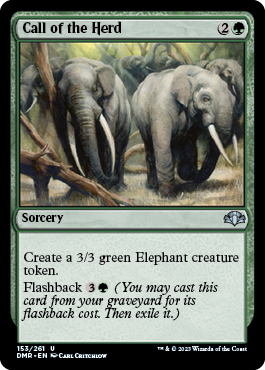
Call of the Herd
{2}{G}
Sorcery
Create a 3/3 green Elephant creature token.
Flashback {3}{G} (You may cast this card from your graveyard for its flashback cost. Then exile it.)
- "Flashback [cost]" means "You may cast this card from your graveyard by paying [cost] rather than paying its mana cost" and "If the flashback cost was paid, exile this card instead of putting it anywhere else any time it would leave the stack."
- You must still follow any timing restrictions and permissions, including those based on the card's type. For example, you can cast a sorcery using flashback only when you could normally cast a sorcery.
- To determine the total cost of a spell, start with the mana cost or alternative cost (such as a flashback cost) you're paying, add any cost increases, then apply any cost reductions. The mana value of the spell is determined only by its mana cost, no matter what the total cost to cast the spell was.
- A spell cast using flashback will always be exiled afterward, regardless of whether it resolves, is countered, or leaves the stack in some other way.
- You can cast a card using flashback even if it was somehow put into your graveyard without having been cast.
- If a card with flashback is put into your graveyard during your turn, you can cast it if it's legal to do so before any other player can take any actions.
Returning Keyword: Madness
Discarding cards is often an opportunity lost. You could have cast that card! With madness, you can have your cake and water it too. Or something.
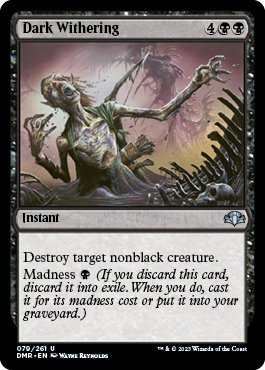
Dark Withering
{4}{B}{B}
Instant
Destroy target nonblack creature.
Madness {B} (If you discard this card, discard it into exile. When you do, cast it for its madness cost or put it into your graveyard.)
- Cards are discarded in a Magic game only from a player's hand. Effects that put cards into a player's graveyard from anywhere else do not cause those cards to be discarded.
- Madness works independently of why you're discarding the card. You could discard it to pay a cost, because a spell or ability tells you to, or because you have too many cards in your hand during your cleanup step. You can't discard a card with madness just because you want to, though.
- A card with madness that's discarded counts as having been discarded even though it's put into exile rather than a graveyard. If it was discarded to pay a cost, that cost is still paid. Abilities that trigger when a card is discarded will still trigger.
- A spell cast for its madness cost is put onto the stack like any other spell. It can be countered, copied, and so on. As it resolves, it's put onto the battlefield if it's a permanent card or into its owner's graveyard if it's an instant or sorcery card.
- Casting a spell with madness ignores the timing rules based on the card's card type. For example, you can cast a sorcery with madness if you discard it during an opponent's turn.
- To determine the total cost of a spell, start with the mana cost or alternative cost (such as a madness cost) you're paying, add any cost increases, then apply any cost reductions. The mana value of the spell is determined by only its mana cost, no matter what the total cost to cast that spell was.
- If you choose not to cast a card with madness when the madness triggered ability resolves, it's put into your graveyard. Madness doesn't give you another chance to cast it later.
- If you discard a card with madness to pay the cost of a spell or activated ability, that card's madness triggered ability (and the spell that card becomes, if you choose to cast it) will resolve before the spell or ability the discard paid for.
- If you discard a card with madness while a spell or ability is resolving, it moves immediately to exile. Continue resolving that spell or ability, noting that the card you discarded is not in your graveyard at this time. Its madness triggered ability will be placed onto the stack once that spell or ability has completely resolved.
Returning Mechanic: Split Cards
Split cards offer flexibility by combining two card faces into a single card. You may not have all the answers, but you'll have at least one more answer than you otherwise might have!
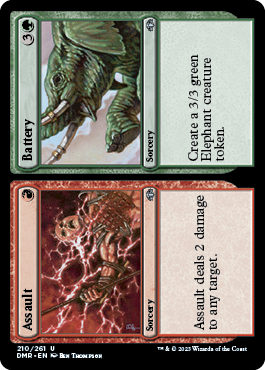
Assault // Battery
{R}
Sorcery
Assault deals 2 damage to any target.
//
Battery
{3}{G}
Sorcery
Create a 3/3 green Elephant creature token.
- To cast a split card, choose one of its halves to cast. There's no way to cast both halves of any of the split cards featured in this set.
- Split cards have two card faces on a single card. The characteristics of the half you didn't cast are ignored while the spell is on the stack.
- Each split card is a single card. For example, if you discard a split card, you've discarded one card, not two. If an effect counts the number of sorcery cards in your graveyard, Assault // Battery counts once, not twice.
- Each split card has two names. If an effect instructs you to choose a card name, you may choose one of those names, but not both.
- A split card's characteristics are a combination of its two halves while it is not on the stack. For example, Assault // Battery has a mana value of 5 while it is in your library. If an effect allows you to search your library for a card with mana value 4 or less, you can't find Assault // Battery.
- If an effect allows you to cast a spell with certain characteristics, consider only the characteristics of the half you're casting. For example, if an effect allows you to cast a sorcery spell with mana value 2 or less from among cards in your graveyard, you could cast Assault this way, but not Battery.
CARD-SPECIFIC NOTES
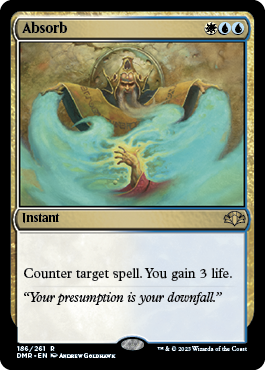
Absorb
{W}{U}{U}
Instant
Counter target spell. You gain 3 life.
- A spell that can't be countered is a legal target for Absorb. The spell won't be countered when Absorb resolves, but you'll still gain 3 life.
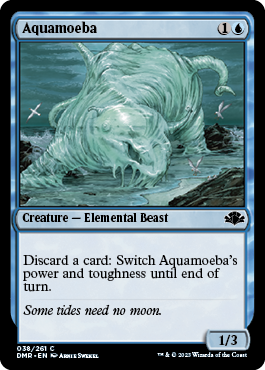
Aquamoeba
{1}{U}
Creature — Elemental Beast
1/3
Discard a card: Switch Aquamoeba's power and toughness until end of turn.
- Effects that switch a creature's power and toughness apply after all other effects, regardless of when those effects began to apply. For example, if Aquamoeba's ability resolves and then you somehow give it +4/+0 later in the turn, it's a 3/5 creature, not a 7/1 creature.
- Because damage remains marked on a creature until the damage is removed as the turn ends, nonlethal damage dealt to a creature may become lethal if you switch its power and toughness during that turn.
- Switching a creature's power and toughness twice (or any even number of times) effectively returns the creature's power and toughness to their values before any switches.
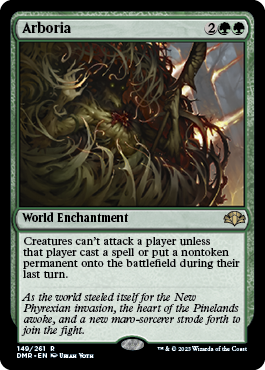
Arboria
{2}{G}{G}
World Enchantment
Creatures can't attack a player unless that player cast a spell or put a nontoken permanent onto the battlefield during their last turn.
- Arboria doesn't stop creatures from attacking planeswalkers, regardless of what their controllers did or didn't do during their last turns.
- Arboria's effect cares whether a player put a nontoken permanent onto the battlefield. It's unusual for an ability to care who put a permanent onto the battlefield, as opposed to under whose control it entered.
- Arboria's effect cares about the actions taken by players, not their results. If a player cast a spell during their last turn but that spell was countered, that player may still be attacked. The same is true if a player put a nontoken permanent onto the battlefield during their last turn, but that permanent left the battlefield before their turn ended.
- If two or more permanents have the world supertype, all of them are put into their owners' graveyards except the one that has had the world supertype for the shortest amount of time. If there's a tie for the shortest amount of time, all world permanents are put into the graveyard.
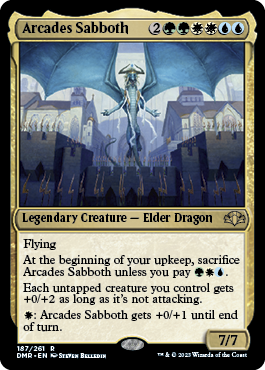
Arcades Sabboth
{2}{G}{G}{W}{W}{U}{U}
Legendary Creature — Elder Dragon
7/7
Flying
At the beginning of your upkeep, sacrifice Arcades Sabboth unless you pay {G}{W}{U}.
Each untapped creature you control gets +0/+2 as long as it's not attacking.
{W}: Arcades Sabboth gets +0/+1 until end of turn.
- As long as Arcades Sabboth is untapped and isn't attacking, it gets +0/+2 from its own third ability.
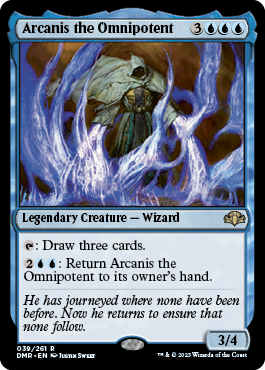
Arcanis the Omnipotent
{3}{U}{U}{U}
Legendary Creature — Wizard
3/4
{T}: Draw three cards.
{2}{U}{U}: Return Arcanis the Omnipotent to its owner's hand.
- Arcanis's last ability can be activated only while it's on the battlefield.
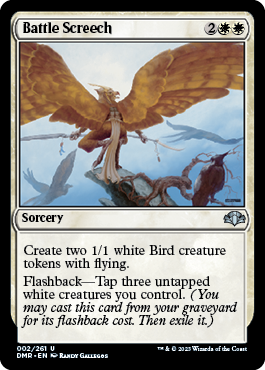
Battle Screech
{2}{W}{W}
Sorcery
Create two 1/1 white Bird creature tokens with flying.
Flashback—Tap three untapped white creatures you control. (You may cast this card from your graveyard for its flashback cost. Then exile it.)
- You can tap any untapped white creatures you control to pay for Battle Screech's flashback cost, even ones you haven't controlled continuously since the beginning of your most recent turn.
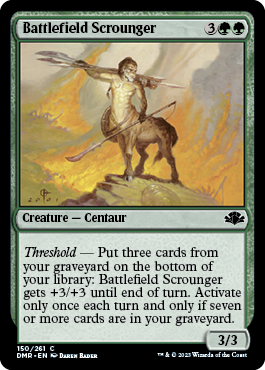
Battlefield Scrounger
{3}{G}{G}
Creature — Centaur
3/3
Threshold — Put three cards from your graveyard on the bottom of your library: Battlefield Scrounger gets +3/+3 until end of turn. Activate only once each turn and only if seven or more cards are in your graveyard.
- Check the number of cards in your graveyard before activating the ability. If activating the ability causes that number to fall below seven, the ability still resolves as normal.
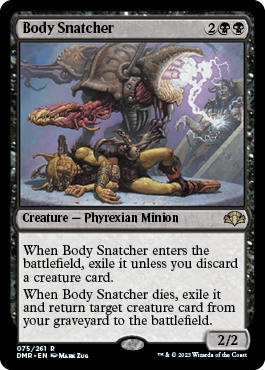
Body Snatcher
{2}{B}{B}
Creature — Phyrexian Minion
2/2
When Body Snatcher enters the battlefield, exile it unless you discard a creature card.
When Body Snatcher dies, exile it and return target creature card from your graveyard to the battlefield.
- You choose whether to discard a card or not as the enters-the-battlefield ability resolves.
- Although you can choose Body Snatcher itself as the target of its last ability, it will be exiled before it can be returned to the battlefield.
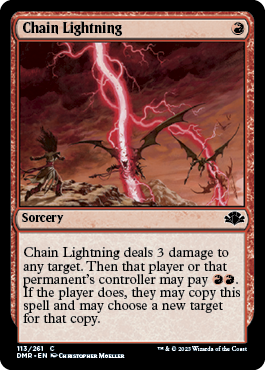
Chain Lightning
{R}
Sorcery
Chain Lightning deals 3 damage to any target. Then that player or that permanent's controller may pay {R}{R}. If the player does, they may copy this spell and may choose a new target for that copy.
- As Chain Lightning resolves, either the original or one of the copies, the targeted player or the controller of the targeted permanent may copy it. The copy has the same text, target, and color as the resolving spell, though the player creating the copy may choose a new target for it. Once that copy is created (or not), the Chain Lightning finishes resolving and leaves the stack.
- The player putting the copy of the spell on the stack controls that copy.
- The copy of Chain Lightning is created on the stack, so it's not cast. Abilities that trigger when a player casts a spell won't trigger. Players may respond to that spell before it resolves.
- If the targeted player or permanent is an illegal target as Chain Lightning tries to resolve, the spell doesn't resolve and none of its effects happen. It can't be copied.
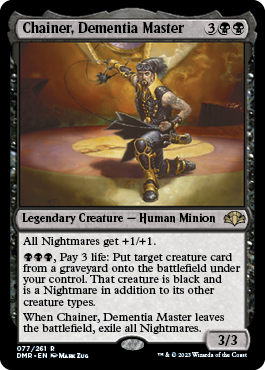
Chainer, Dementia Master
{3}{B}{B}
Legendary Creature — Human Minion
3/3
All Nightmares get +1/+1.
{B}{B}{B}, Pay 3 life: Put target creature card from a graveyard onto the battlefield under your control. That creature is black and is a Nightmare in addition to its other creature types.
When Chainer, Dementia Master leaves the battlefield, exile all Nightmares.
- The creature put onto the battlefield by Chainer's activated ability is black only, not black in addition to its other colors. It is, however, a Nightmare in addition to its other creature types. As it enters the battlefield, it is already a black Nightmare (and perhaps some other creature types); it doesn't enter and then become a black Nightmare.
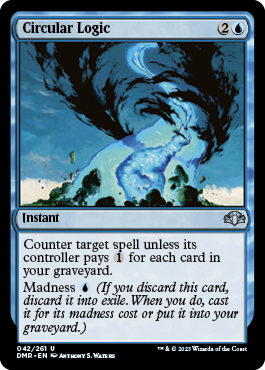
Circular Logic
{2}{U}
Instant
Counter target spell unless its controller pays {1} for each card in your graveyard.
Madness {U} (If you discard this card, discard it into exile. When you do, cast it for its madness cost or put it into your graveyard.)
- Count the number of cards in your graveyard as Circular Logic resolves to determine how much the controller of the target spell has to pay. Circular Logic is still on the stack at that time. It doesn't count itself.
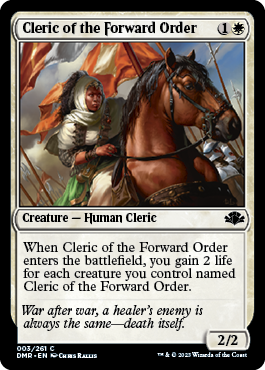
Cleric of the Forward Order
{1}{W}
Creature — Human Cleric
2/2
When Cleric of the Forward Order enters the battlefield, you gain 2 life for each creature you control named Cleric of the Forward Order.
- Count the number of creatures named Cleric of the Forward Order you control as the ability resolves to determine how much life you gain. If the Cleric of the Forward Order with the ability that triggered is still on the battlefield, it will count itself.
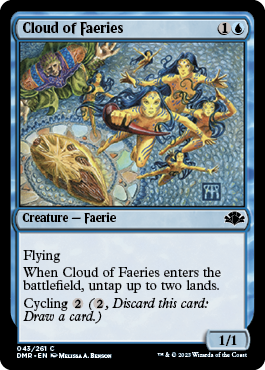
Cloud of Faeries
{1}{U}
Creature — Faerie
1/1
Flying
When Cloud of Faeries enters the battlefield, untap up to two lands.
Cycling {2} ({2}, Discard this card: Draw a card.)
- You choose which lands to untap as the triggered ability resolves. They aren't targeted, and they don't have to be lands that you control.
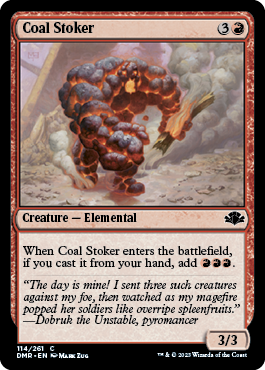
Coal Stoker
{3}{R}
Creature — Elemental
3/3
When Coal Stoker enters the battlefield, if you cast it from your hand, add {R}{R}{R}.
- If a nontoken creature enters the battlefield as a copy of this creature, the copy's enters-the-battlefield ability will still trigger as long as you cast the spell that became that nontoken creature from your hand.
- If a token is created that's a copy of Coal Stoker, the token wasn't cast, and Coal Stoker's ability won't trigger. Similarly, if an effect copies Coal Stoker while it's on the stack, the copy becomes a token, but the copy was created on the stack and not cast from your hand, so the ability won't trigger in that case either.
- Coal Stoker's ability isn't a mana ability. It uses the stack and can be responded to.
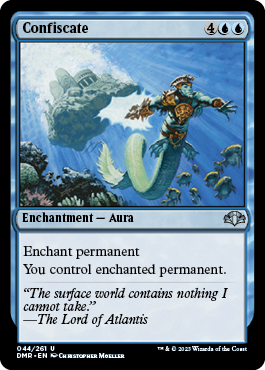
Confiscate
{4}{U}{U}
Enchantment — Aura
Enchant permanent
You control enchanted permanent.
- Gaining control of a permanent doesn't cause you to gain control of any Auras or Equipment attached to it.
- Gaining control of an Aura or Equipment doesn't change what it's attached to.
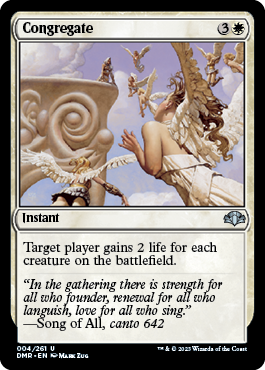
Congregate
{3}{W}
Instant
Target player gains 2 life for each creature on the battlefield.
- Count the number of creatures as Congregate resolves to determine how much life is gained.
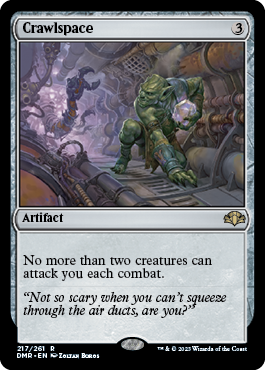
Crawlspace
{3}
Artifact
No more than two creatures can attack you each combat.
- Your opponents can still attack planeswalkers you control with any number of creatures each combat.
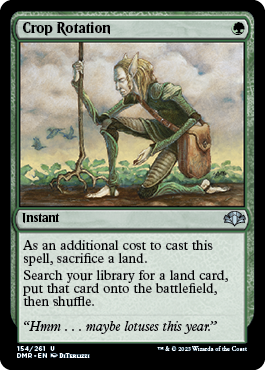
Crop Rotation
{G}
Instant
As an additional cost to cast this spell, sacrifice a land.
Search your library for a land card, put that card onto the battlefield, then shuffle.
- You can't cast Crop Rotation without sacrificing a land, and you can't sacrifice additional lands.
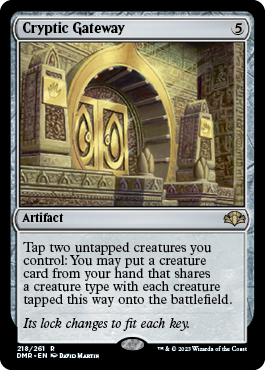
Cryptic Gateway
{5}
Artifact
Tap two untapped creatures you control: You may put a creature card from your hand that shares a creature type with each creature tapped this way onto the battlefield.
- The two creatures you tap to activate the ability don't necessarily have to share a creature type, but the creature card you put onto the battlefield must share a creature type with each of them. For example, you could tap an Elf Wizard and a Human Warrior to put an Elf Warrior card onto the battlefield.
- You can tap any untapped creatures you control to activate Cryptic Gateway's ability, even ones you haven't controlled continuously since the beginning of your most recent turn.
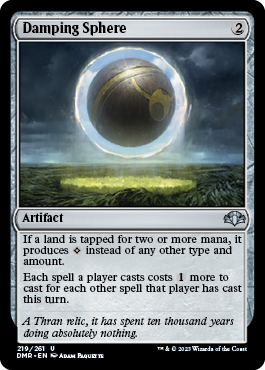
Damping Sphere
{2}
Artifact
If a land is tapped for two or more mana, it produces {C} instead of any other type and amount.
Each spell a player casts costs {1} more to cast for each other spell that player has cast this turn.
- If multiple replacement effects would modify the mana an ability you control produces, choose one to apply. After that, determine if any others are applicable. A replacement effect can't apply to the same event more than once.
- Damping Sphere's second ability counts spells that were cast during a turn even if Damping Sphere wasn't on the battlefield as they were cast. For example, if Damping Sphere itself is the third spell you cast in a turn, the next spell you cast costs {3} more to cast.
- To determine the total cost of a spell, start with the mana cost or alternative cost (such as a flashback cost) you're paying, add any cost increases, then apply any cost reductions. The mana value of the spell is determined only by its mana cost, no matter what the total cost to cast the spell was.
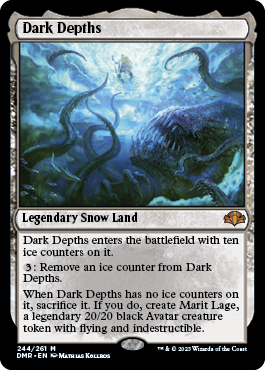
Dark Depths
Legendary Snow Land
Dark Depths enters the battlefield with ten ice counters on it.
{3}: Remove an ice counter from Dark Depths.
When Dark Depths has no ice counters on it, sacrifice it. If you do, create Marit Lage, a legendary 20/20 black Avatar creature token with flying and indestructible.
- Dark Depths doesn't have a mana ability. It doesn't tap for colorless mana.
- The last ability of Dark Depths is a state trigger. It won't trigger again while the ability is on the stack, but if the ability is countered and Dark Depths is still on the battlefield with no ice counters on it, it will trigger again immediately.
- If Dark Depths leaves the battlefield before its triggered ability resolves, you won't be able to sacrifice it, so you won't create Marit Lage.
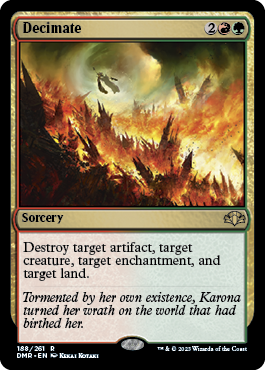
Decimate
{2}{R}{G}
Sorcery
Destroy target artifact, target creature, target enchantment, and target land.
- You must choose a legal target for each target required by Decimate. However, if a permanent has multiple card types, it may be chosen as the target for more than one instance of the word "target." For example, you could cast Decimate targeting an artifact creature, an enchantment, and a land.
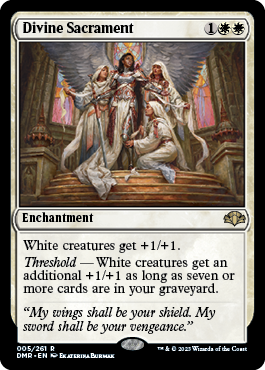
Divine Sacrament
{1}{W}{W}
Enchantment
White creatures get +1/+1.
Threshold — White creatures get an additional +1/+1 as long as seven or more cards are in your graveyard.
- Because damage remains marked on a creature until the damage is removed as the turn ends, nonlethal damage dealt to white creatures you control may become lethal if the number of cards in your graveyard falls below seven or if Divine Sacrament leaves the battlefield.
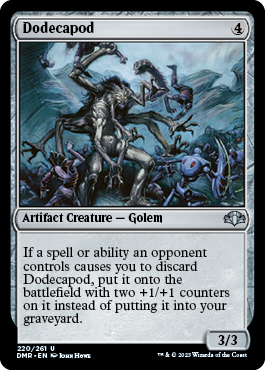
Dodecapod
{4}
Artifact Creature — Golem
3/3
If a spell or ability an opponent controls causes you to discard Dodecapod, put it onto the battlefield with two +1/+1 counters on it instead of putting it into your graveyard.
- If a spell or ability an opponent controls causes you to choose a card to discard and you discard Dodecapod, you'll put it onto the battlefield.
- If you discard Dodecapod and put it onto the battlefield, you've still discarded it. Abilities that trigger whenever you discard a card will trigger.
- If the spell or ability that caused you to discard Dodecapod refers to "the discarded card" or similar, it refers to the Dodecapod on the battlefield.
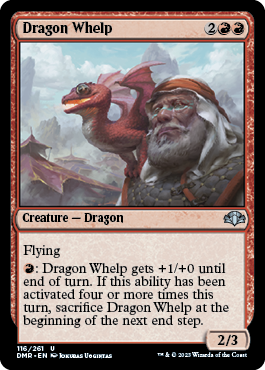
Dragon Whelp
{2}{R}{R}
Creature — Dragon
2/3
Flying
{R}: Dragon Whelp gets +1/+0 until end of turn. If this ability has been activated four or more times this turn, sacrifice Dragon Whelp at the beginning of the next end step.
- There's no limit to the number of times you can activate Dragon Whelp's ability in a turn. However, the fourth activation in a turn and each subsequent activation will cause a delayed triggered ability that will force you to sacrifice Dragon Whelp at the beginning of the next end step.
- If the fourth (or subsequent) time Dragon Whelp's ability is activated during the same turn is during that turn's end step, the delayed triggered ability won't trigger until the beginning of the next turn's end step. You'll have to sacrifice Dragon Whelp at that time.
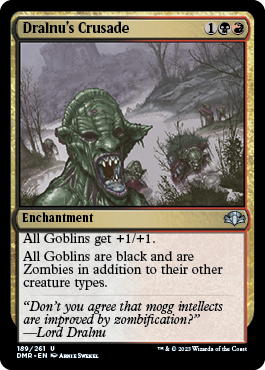
Dralnu's Crusade
{1}{B}{R}
Enchantment
All Goblins get +1/+1.
All Goblins are black and are Zombies in addition to their other creature types.
- Under Dralnu's Crusade, Goblins are black only, not black in addition to any other colors. They are, however, Zombies in addition to their other creature types. As one enters the battlefield, it is already a black Goblin Zombie (and perhaps some other creature types) with +1/+1; it doesn't enter and then become a black Goblin Zombie and get +1/+1.
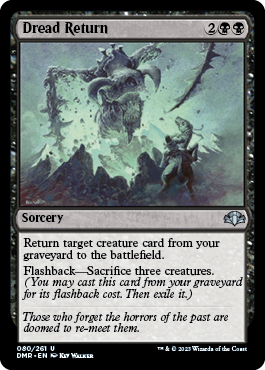
Dread Return
{2}{B}{B}
Sorcery
Return target creature card from your graveyard to the battlefield.
Flashback—Sacrifice three creatures. (You may cast this card from your graveyard for its flashback cost. Then exile it.)
- You choose the target for Dread Return before paying any of its costs, so it's not possible to cast it using flashback and bring back one of the creatures you sacrifice.
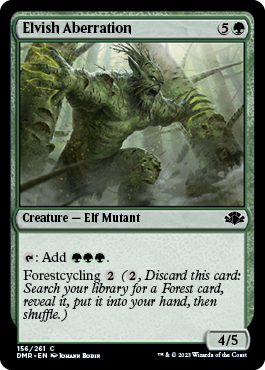
Elvish Aberration
{5}{G}
Creature — Elf Mutant
4/5
{T}: Add {G}{G}{G}.
Forestcycling {2} ({2}, Discard this card: Search your library for a Forest card, reveal it, put it into your hand, then shuffle.)
- Forestcycling is a variant of the cycling ability. Unlike cycling (which allows you to draw a card), forestcycling allows you to search your library for a Forest card. The card you find can be a basic Forest or any land card with the Forest land type.
- Any ability that triggers whenever a card is cycled will trigger if you activate a forestcycling ability.
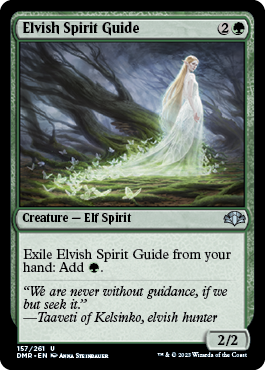
Elvish Spirit Guide
{2}{G}
Creature — Elf Spirit
2/2
Exile Elvish Spirit Guide from your hand: Add {G}.
- If a spell or ability's cost includes returning a creature to your hand and paying mana, you can't activate Elvish Spirit Guide's mana ability after returning it to your hand. This is because mana abilities must be activated before you begin paying costs.
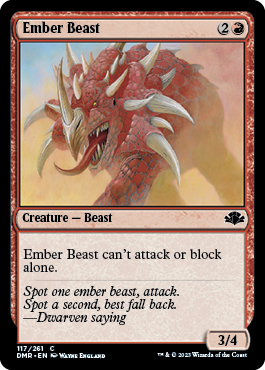
Ember Beast
{2}{R}
Creature — Beast
3/4
Ember Beast can't attack or block alone.
- Ember Beast can't attack or block unless another creature is also assigned to attack or block at the same time. Notably, two Ember Beasts can attack or block together.
- Once Ember Beast has been declared as an attacker or blocker, it doesn't matter what happens to the other creature(s).
- Other creatures assigned to attack alongside Ember Beast don't have to attack the same player or planeswalker. Other creatures assigned to block alongside Ember Beast don't have to block the same creature as Ember Beast.
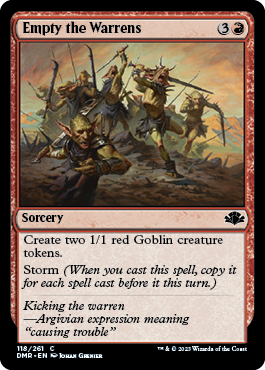
Empty the Warrens
{3}{R}
Sorcery
Create two 1/1 red Goblin creature tokens.
Storm (When you cast this spell, copy it for each spell cast before it this turn.)
- The copies are put directly onto the stack. They aren't cast and won't be counted by other spells with storm cast later in the turn.
- Spells cast from zones other than a player's hand and spells that were countered are counted by the storm ability.
- A copy of a spell can be countered like any other spell, but it must be countered individually. Countering a spell with storm won't affect the copies.
- The triggered ability that creates the copies can itself be countered by anything that can counter a triggered ability. If it is countered, no copies will be put onto the stack.
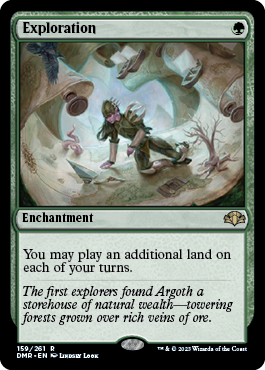
Exploration
{G}
Enchantment
You may play an additional land on each of your turns.
- Exploration's ability is cumulative with other effects that allow you to play additional lands, including ones created by other Explorations you control.
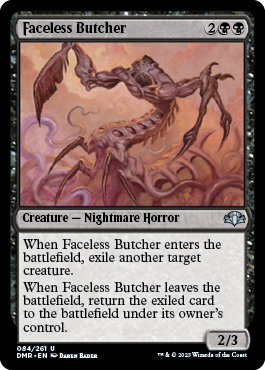
Faceless Butcher
{2}{B}{B}
Creature — Nightmare Horror
2/3
When Faceless Butcher enters the battlefield, exile another target creature.
When Faceless Butcher leaves the battlefield, return the exiled card to the battlefield under its owner's control.
- Faceless Butcher's first ability isn't optional. If no other players control any creatures and you do, you must choose a creature you control as the target.
- If Faceless Butcher exiles a token creature, the token will cease to exist after being exiled. It won't return to the battlefield because of the second ability.
- If Faceless Butcher exiles a second Faceless Butcher, and then a third Faceless Butcher comes along and exiles the first one, the second one will return to the battlefield. If there are no other creatures on the battlefield, the second will exile the third one, returning the first one, and so on. If no one can stop the loop, the game will be a draw.
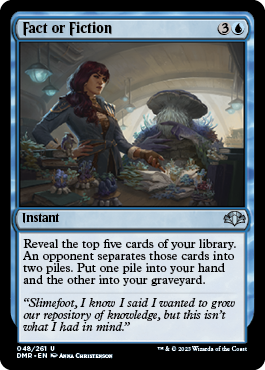
Fact or Fiction
{3}{U}
Instant
Reveal the top five cards of your library. An opponent separates those cards into two piles. Put one pile into your hand and the other into your graveyard.
- Piles may be empty.
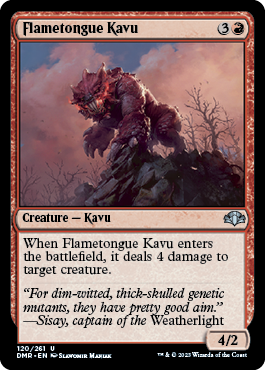
Flametongue Kavu
{3}{R}
Creature — Kavu
4/2
When Flametongue Kavu enters the battlefield, it deals 4 damage to target creature.
- Flametongue Kavu's ability can target itself. If it's the only creature on the battlefield as its ability triggers, its ability must target itself.
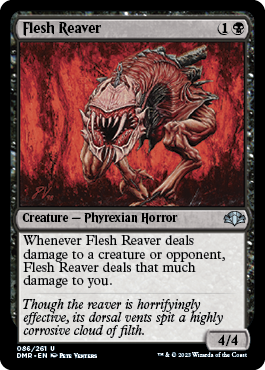
Flesh Reaver
{1}{B}
Creature — Phyrexian Horror
4/4
Whenever Flesh Reaver deals damage to a creature or opponent, Flesh Reaver deals that much damage to you.
- Flesh Reaver's ability triggers whenever it deals any damage to a creature or opponent, not only combat damage.
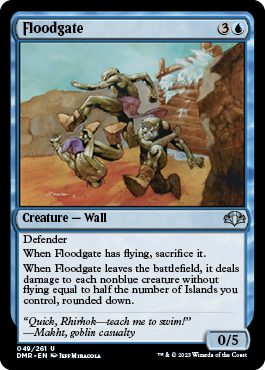
Floodgate
{3}{U}
Creature — Wall
0/5
Defender
When Floodgate has flying, sacrifice it.
When Floodgate leaves the battlefield, it deals damage to each nonblue creature without flying equal to half the number of Islands you control, rounded down.
- Floodgate's first triggered ability is a state trigger. It won't trigger again while the ability is on the stack, but if the ability is countered and Floodgate still has flying, it will trigger again immediately.
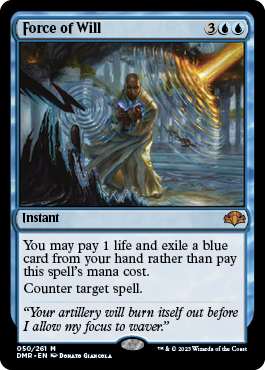
Force of Will
{3}{U}{U}
Instant
You may pay 1 life and exile a blue card from your hand rather than pay this spell's mana cost.
Counter target spell.
- To determine the total cost of a spell, start with the mana cost or alternative cost you're paying (such as the alternative cost of Force of Will), add any cost increases, then apply any cost reductions. Force of Will's mana value is always 5, no matter what you paid to cast it.
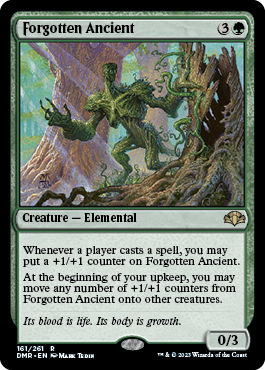
Forgotten Ancient
{3}{G}
Creature — Elemental
0/3
Whenever a player casts a spell, you may put a +1/+1 counter on Forgotten Ancient.
At the beginning of your upkeep, you may move any number of +1/+1 counters from Forgotten Ancient onto other creatures.
- Forgotten Ancient's first ability will resolve before the spell that caused it to trigger. Putting a +1/+1 counter on Forgotten Ancient is optional.
- Forgotten Ancient's last ability doesn't target any creatures. You choose how many +1/+1 counters will be moved (and onto which creatures) as the ability resolves. Notably, once the ability starts resolving and you make these choices, no player may take actions until the ability has finished resolving.
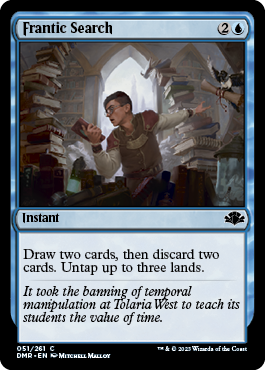
Frantic Search
{2}{U}
Instant
Draw two cards, then discard two cards. Untap up to three lands.
- You choose which lands to untap as Frantic Search resolves. They aren't targeted, and they don't have to be lands that you control.
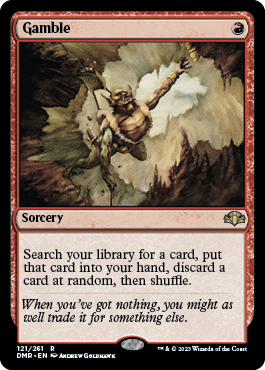
Gamble
{R}
Sorcery
Search your library for a card, put that card into your hand, discard a card at random, then shuffle.
- You might end up discarding the card you searched for. It's a gamble!
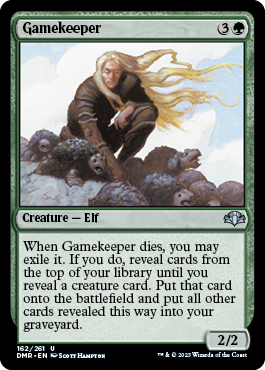
Gamekeeper
{3}{G}
Creature — Elf
2/2
When Gamekeeper dies, you may exile it. If you do, reveal cards from the top of your library until you reveal a creature card. Put that card onto the battlefield and put all other cards revealed this way into your graveyard.
- If Gamekeeper is no longer in your graveyard as its triggered ability resolves, you can't choose to exile it. You won't reveal cards from your library.
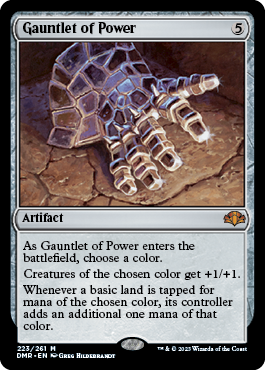
Gauntlet of Power
{5}
Artifact
As Gauntlet of Power enters the battlefield, choose a color.
Creatures of the chosen color get +1/+1.
Whenever a basic land is tapped for mana of the chosen color, its controller adds an additional one mana of that color.
- If Gauntlet of Power is somehow on the battlefield with no color chosen for its first ability, no creatures get +1/+1 and its last ability never triggers. It still won't affect colorless creatures or basic lands tapped for colorless mana.
- Because damage remains marked on a creature until the damage is removed as the turn ends, nonlethal damage dealt to a creature of the chosen color may become lethal if Gauntlet of Power leaves the battlefield during that turn.
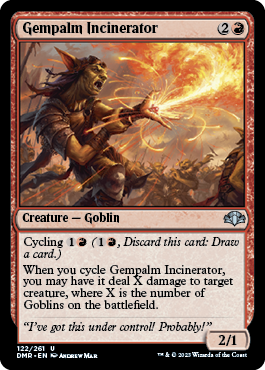
Gempalm Incinerator
{2}{R}
Creature — Goblin
2/1
Cycling {1}{R} ({1}{R}, Discard this card: Draw a card.)
When you cycle Gempalm Incinerator, you may have it deal X damage to target creature, where X is the number of Goblins on the battlefield.
- You can cycle this card even if there are no legal targets for the triggered ability.
- When you cycle this card, first the cycling ability goes on the stack, then the triggered ability goes on the stack on top of it. The triggered ability will resolve before you draw a card from the cycling ability.
- The cycling ability and the triggered ability are separate. If the triggered ability doesn't resolve (because, for example, it has been countered, or all of its targets have become illegal), the cycling ability will still resolve, and you'll draw a card.
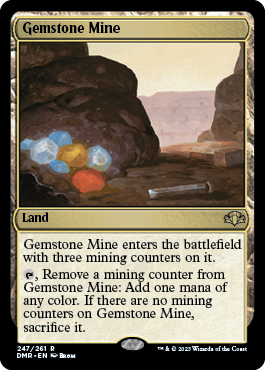
Gemstone Mine
Land
Gemstone Mine enters the battlefield with three mining counters on it.
{T}, Remove a mining counter from Gemstone Mine: Add one mana of any color. If there are no mining counters on Gemstone Mine, sacrifice it.
- If the last mining counter is removed from Gemstone Mine in some way other than activating its ability, Gemstone Mine won't be sacrificed (and its ability can't be activated).
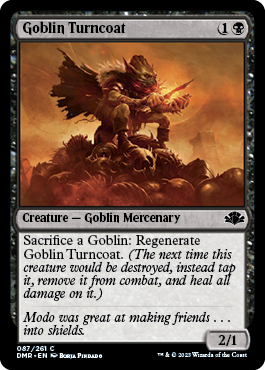
Goblin Turncoat
{1}{B}
Creature — Goblin Mercenary
2/1
Sacrifice a Goblin: Regenerate Goblin Turncoat. (The next time this creature would be destroyed, instead tap it, remove it from combat, and heal all damage on it.)
- Activating the ability creates a replacement effect that acts like a shield, replacing the next time Goblin Turncoat would be destroyed that turn. This shield works against effects that try to destroy Goblin Turncoat or lethal damage that would be dealt to Goblin Turncoat.
- Goblin Turncoat can regenerate even if it isn't in combat, it's already tapped, or it's undamaged.
- You can activate the regeneration ability even if Goblin Turncoat isn't at risk of being destroyed. Sometimes you need to sacrifice Goblins. We understand.
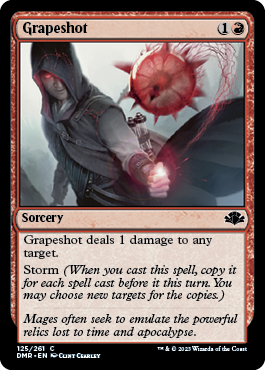
Grapeshot
{1}{R}
Sorcery
Grapeshot deals 1 damage to any target.
Storm (When you cast this spell, copy it for each spell cast before it this turn. You may choose new targets for the copies.)
- The copies are put directly onto the stack. They aren't cast and won't be counted by other spells with storm cast later in the turn.
- Spells cast from zones other than a player's hand and spells that were countered are counted by the storm ability.
- A copy of a spell can be countered like any other spell, but it must be countered individually. Countering a spell with storm won't affect the copies.
- The triggered ability that creates the copies can itself be countered by anything that can counter a triggered ability. If it is countered, no copies will be put onto the stack.
- You may choose new targets for any of the copies. You can make different choices for each copy.
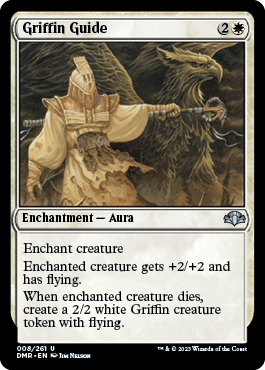
Griffin Guide
{2}{W}
Enchantment — Aura
Enchant creature
Enchanted creature gets +2/+2 and has flying.
When enchanted creature dies, create a 2/2 white Griffin creature token with flying.
- If Griffin Guide and the enchanted creature go to the graveyard at the same time, Griffin Guide's last ability will trigger.
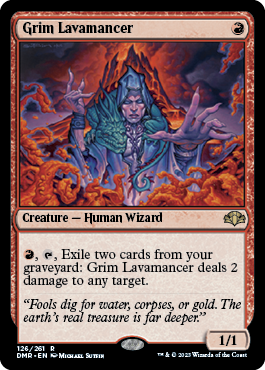
Grim Lavamancer
{R}
Creature — Human Wizard
1/1
{R}, {T}, Exile two cards from your graveyard: Grim Lavamancer deals 2 damage to any target.
- The two cards are exiled as the cost of Grim Lavamancer's ability is paid. Players can't respond to the paying of costs by trying to move those cards to another zone.
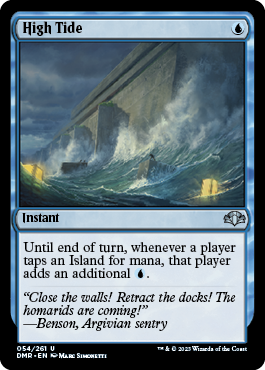
High Tide
{U}
Instant
Until end of turn, whenever a player taps an Island for mana, that player adds an additional {U}.
- The delayed triggered ability refers to any land with the land type Island, not just those named Island.
- The effect applies even if the Island in question entered the battlefield after High Tide resolved.
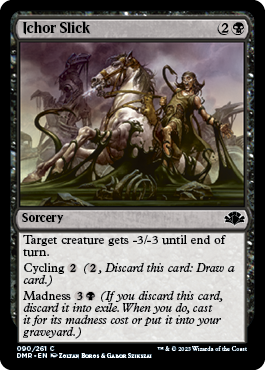
Ichor Slick
{2}{B}
Sorcery
Target creature gets -3/-3 until end of turn.
Cycling {2} ({2}, Discard this card: Draw a card.)
Madness {3}{B} (If you discard this card, discard it into exile. When you do, cast it for its madness cost or put it into your graveyard.)
- If you cycle Ichor Slick, you may cast it for its madness cost. You choose whether or not to cast it with madness before you draw a card from the cycling ability.
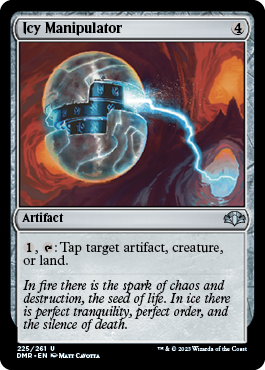
Icy Manipulator
{4}
Artifact
{1}, {T}: Tap target artifact, creature, or land.
- Once a player announces that they're casting a spell or activating an ability, no player may take other actions until the spell or ability has been paid for. Notably, other players can't try to tap that player's permanents to stop them from paying {T} or to stop them from producing enough mana.
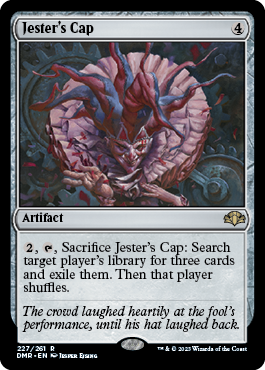
Jester's Cap
{4}
Artifact
{2}, {T}, Sacrifice Jester's Cap: Search target player's library for three cards and exile them. Then that player shuffles.
- As long as there are three or more cards in that library, you must find three cards and exile them. If there are fewer than three cards in the player's library, you exile all of them.
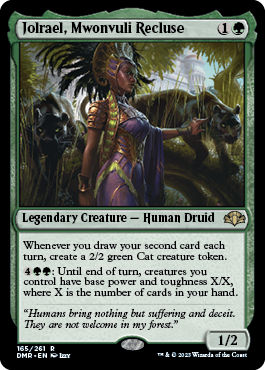
Jolrael, Mwonvuli Recluse
{1}{G}
Legendary Creature — Human Druid
1/2
Whenever you draw your second card each turn, create a 2/2 green Cat creature token.
{4}{G}{G}: Until end of turn, creatures you control have base power and toughness X/X, where X is the number of cards in your hand.
- The triggered ability can trigger only once each turn. It doesn't matter if Jolrael was on the battlefield when the first card was drawn: if it's not on the battlefield when the second card is drawn, the ability can't trigger at all that turn.
- Jolrael's last ability overwrites all previous effects that set the affected creatures' power and/or toughness to specific values. If other effects that set these characteristics to specific values start to apply after Jolrael's ability resolves, they will overwrite that part of the effect.
- Effects that modify an affected creature's power and/or toughness without setting them to specific values will apply no matter when those effects began. The same is true for counters that change the creature's power and/or toughness.
- The value of X is determined only as Jolrael's last ability resolves. Once that happens, the value of X won't change later in the turn even if the number of cards in your hand changes.
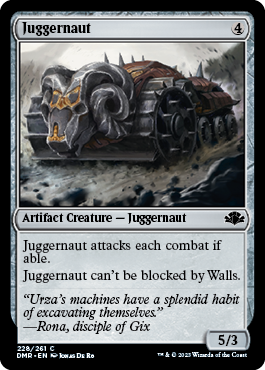
Juggernaut
{4}
Artifact Creature — Juggernaut
5/3
Juggernaut attacks each combat if able.
Juggernaut can't be blocked by Walls.
- If Juggernaut can't attack for any reason (such as being tapped or having come under your control that turn), then it doesn't attack. If there's a cost associated with having it attack, you're not forced to pay that cost, so it doesn't have to attack in that case either.
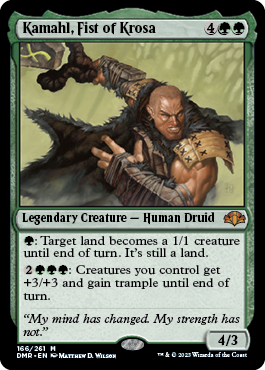
Kamahl, Fist of Krosa
{4}{G}{G}
Legendary Creature — Human Druid
4/3
{G}: Target land becomes a 1/1 creature until end of turn. It's still a land.
{2}{G}{G}{G}: Creatures you control get +3/+3 and gain trample until end of turn.
- Lands that become creatures retain any other supertypes, card types, subtypes, and abilities they have.
- A noncreature permanent that becomes a creature can attack and its {T} abilities can be activated only if its controller has continuously controlled that permanent since the beginning of their most recent turn. It doesn't matter how long the permanent has been a creature. Notably, if you turn a land into a creature on the turn it entered the battlefield, you won't be able to tap it for mana.
- Kamahl's last ability affects only creatures you control as it resolves. Creatures that come under your control after that point (including lands that become creatures) won't get the bonuses.
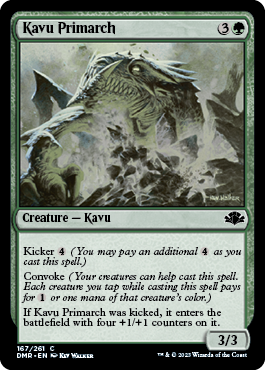
Kavu Primarch
{3}{G}
Creature — Kavu
3/3
Kicker {4} (You may pay an additional {4} as you cast this spell.)
Convoke (Your creatures can help cast this spell. Each creature you tap while casting this spell pays for {1} or one mana of that creature's color.)
If Kavu Primarch was kicked, it enters the battlefield with four +1/+1 counters on it.
- You can tap any untapped creature you control to convoke a spell, even one you haven't controlled continuously since the beginning of your most recent turn.
- When calculating a spell's total cost, include any alternative costs, additional costs, or anything else that increases or reduces the cost to cast the spell. Convoke applies after the total cost is calculated. Convoke doesn't change a spell's mana cost or mana value.
- If a creature you control has a mana ability with {T} in the cost, activating that ability while casting a spell with convoke will result in the creature being tapped before you pay the spell's costs. You won't be able to tap it again for convoke. Similarly, if you sacrifice a creature to activate a mana ability while casting a spell with convoke, that creature won't be on the battlefield when you pay the spell's costs, so you won't be able to tap it for convoke.
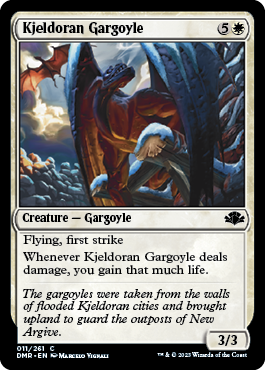
Kjeldoran Gargoyle
{5}{W}
Creature — Gargoyle
3/3
Flying, first strike
Whenever Kjeldoran Gargoyle deals damage, you gain that much life.
- Kjeldoran Gargoyle's triggered ability triggers when it deals any damage, not only combat damage.
- Unlike lifelink, Kjeldoran Gargoyle's last ability is a triggered ability that goes on the stack and may be responded to. Notably, if Kjeldoran Gargoyle deals damage at the same time you're dealt enough damage to reduce your life total to 0 or less, you'll lose the game before you can gain any life.
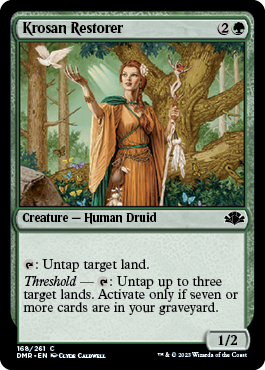
Krosan Restorer
{2}{G}
Creature — Human Druid
1/2
{T}: Untap target land.
Threshold — {T}: Untap up to three target lands. Activate only if seven or more cards are in your graveyard.
- Krosan Restorer's activated abilities aren't mana abilities. They each use the stack and can be responded to. Notably, they can't be activated while you're casting a spell or activating another ability. If you want to use Krosan Restorer to add enough mana to pay for a spell or ability, you may tap land(s) you control, untap them with Krosan Restorer, and tap the lands again all before you start casting a spell or activating an ability.
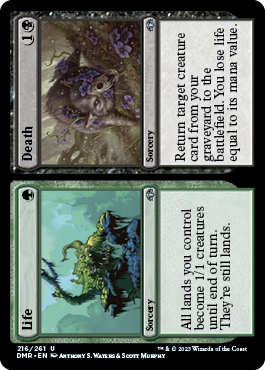
Life // Death
{G}
Sorcery
All lands you control become 1/1 creatures until end of turn. They're still lands.
//
Death
{1}{B}
Sorcery
Return target creature card from your graveyard to the battlefield. You lose life equal to its mana value.
- Lands that become creatures retain any other supertypes, card types, subtypes, and abilities they have.
- A noncreature permanent that becomes a creature can attack, and its {T} abilities can be activated, only if its controller has continuously controlled that permanent since the beginning of their most recent turn. It doesn't matter how long the permanent has been a creature. Notably, if you turn a land into a creature on the turn it entered the battlefield, you won't be able to tap it for mana.
- If the card returned to the battlefield by Death has {X} in its mana cost, X is 0.
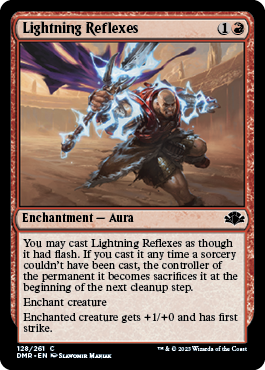
Lightning Reflexes
{1}{R}
Enchantment — Aura
You may cast Lightning Reflexes as though it had flash. If you cast it any time a sorcery couldn't have been cast, the controller of the permanent it becomes sacrifices it at the beginning of the next cleanup step.
Enchant creature
Enchanted creature gets +1/+0 and has first strike.
- The sacrifice occurs only if you cast it using its own ability. If you cast it using some other effect (for example, if another effect allowed you to cast it as though it had flash), then it won't be sacrificed.
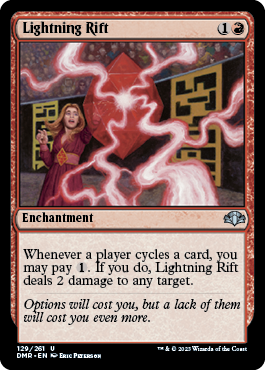
Lightning Rift
{1}{R}
Enchantment
Whenever a player cycles a card, you may pay {1}. If you do, Lightning Rift deals 2 damage to any target.
- You choose the target when Lightning Rift's ability is put on the stack, but you choose whether to pay the mana as the ability resolves. Once you make that choice, no player may take actions until the damage is dealt and the ability has finished resolving.
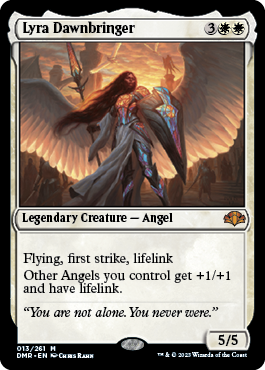
Lyra Dawnbringer
{3}{W}{W}
Legendary Creature — Angel
5/5
Flying, first strike, lifelink
Other Angels you control get +1/+1 and have lifelink.
- Multiple instances of lifelink on the same creature are redundant.
- Because damage remains marked on a creature until it's removed as the turn ends, nonlethal damage dealt to an Angel you control may become lethal if Lyra leaves the battlefield during that turn.
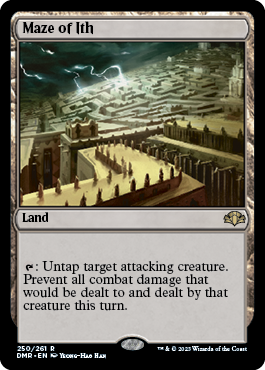
Maze of Ith
Land
{T}: Untap target attacking creature. Prevent all combat damage that would be dealt to and dealt by that creature this turn.
- Maze of Ith doesn't have a mana ability. It doesn't tap for colorless mana.
- Maze of Ith can target an untapped attacking creature. It will still prevent the combat damage it would deal and be dealt.
- The creature isn't removed from combat; it just has its damage prevented. It's still an attacking creature until the combat phase is complete.
- You can activate Maze of Ith's ability targeting an attacking creature you control during the combat damage step or the end of combat step, even though it will already have dealt combat damage. This will untap the creature. The damage it dealt will be unaffected.
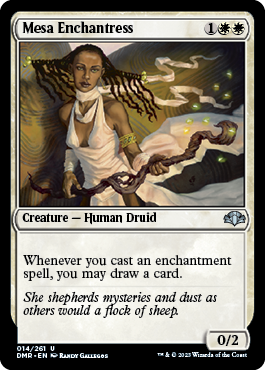
Mesa Enchantress
{1}{W}{W}
Creature — Human Druid
0/2
Whenever you cast an enchantment spell, you may draw a card.
- Mesa Enchantress's ability will resolve before the spell that caused it to trigger.
- If the enchantment spell is countered, Mesa Enchantress's ability still resolves and causes you to draw a card.
- Enchantments put onto the battlefield without being cast won't cause Mesa Enchantress's ability to trigger.
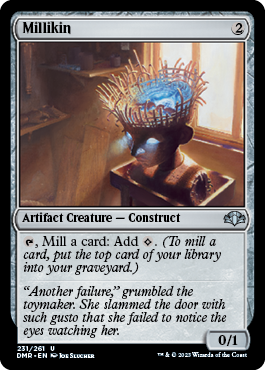
Millikin
{2}
Artifact Creature — Construct
0/1
{T}, Mill a card: Add {C}. (To mill a card, put the top card of your library into your graveyard.)
- If an effect allows you to look at the top card of your library any time or to play with the top card of your library revealed, and you activate Millikin's mana ability while casting a spell, you can't look at the new top card of your library until you are done casting the spell. The same is true if you activate Millikin's ability while activating another ability.
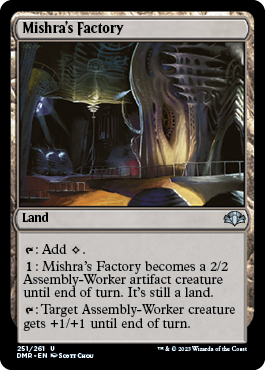
Mishra's Factory
Land
{T}: Add {C}.
{1}: Mishra's Factory becomes a 2/2 Assembly-Worker artifact creature until end of turn. It's still a land.
{T}: Target Assembly-Worker creature gets +1/+1 until end of turn.
- After it becomes a creature, Mishra's Factory will still have all its abilities.
- A noncreature permanent that becomes a creature can attack, and its {T} abilities can be activated, only if its controller has continuously controlled that permanent since the beginning of their most recent turn. It doesn't matter how long the permanent has been a creature. Notably, if you turn Mishra's Factory into a creature on the turn it entered the battlefield, you won't be able to then activate its first or last abilities.
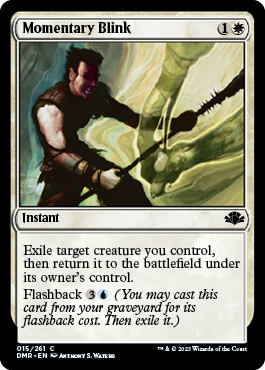
Momentary Blink
{1}{W}
Instant
Exile target creature you control, then return it to the battlefield under its owner's control.
Flashback {3}{U} (You may cast this card from your graveyard for its flashback cost. Then exile it.)
- When the card returns to the battlefield, it will be a new object with no connection to the card that was exiled. Auras attached to the exiled creature will be put into their owners' graveyards. Any Equipment will become unattached and remain on the battlefield. Any counters on the exiled creature will cease to exist.
- If a token is exiled this way, it will cease to exist and won't return to the battlefield.
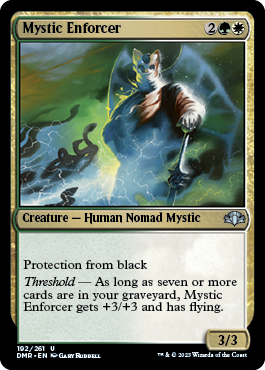
Mystic Enforcer
{2}{G}{W}
Creature — Human Nomad Mystic
3/3
Protection from black
Threshold — As long as seven or more cards are in your graveyard, Mystic Enforcer gets +3/+3 and has flying.
- Because damage remains marked on a creature until the damage is removed as the turn ends, nonlethal damage dealt to Mystic Enforcer may become lethal if the number of cards in your graveyard falls below seven.
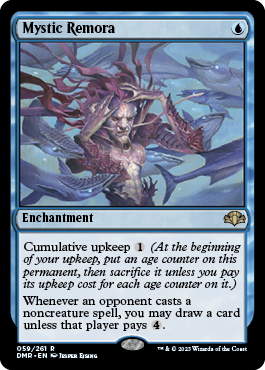
Mystic Remora
{U}
Enchantment
Cumulative upkeep {1} (At the beginning of your upkeep, put an age counter on this permanent, then sacrifice it unless you pay its upkeep cost for each age counter on it.)
Whenever an opponent casts a noncreature spell, you may draw a card unless that player pays {4}.
- Paying cumulative upkeep is always optional. If it's not paid, the permanent with cumulative upkeep is sacrificed. Partial payments of the total cumulative upkeep cost can't be made. For example, if Mystic Remora has three age counters on it when its cumulative upkeep ability triggers, it gets another age counter and then its controller chooses to either pay {4} or sacrifice it.
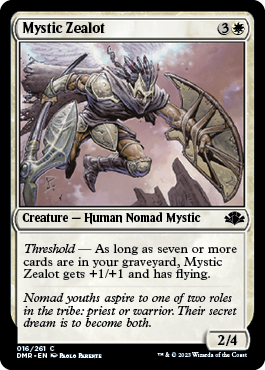
Mystic Zealot
{3}{W}
Creature — Human Nomad Mystic
2/4
Threshold — As long as seven or more cards are in your graveyard, Mystic Zealot gets +1/+1 and has flying.
- Because damage remains marked on a creature until the damage is removed as the turn ends, nonlethal damage dealt to Mystic Zealot may become lethal if the number of cards in your graveyard falls below seven.
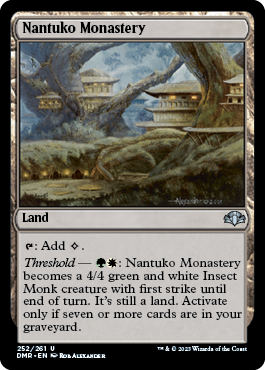
Nantuko Monastery
Land
{T}: Add {C}.
Threshold — {G}{W}: Nantuko Monastery becomes a 4/4 green and white Insect Monk creature with first strike until end of turn. It's still a land. Activate only if seven or more cards are in your graveyard.
- After it becomes a creature, Nantuko Monastery will still have all its abilities.
- Once you activate the last ability, it doesn't matter what happens to the number of cards in your graveyard. Nantuko Monastery will remain a creature that turn even if that number falls below seven.
- A noncreature permanent that becomes a creature can attack, and its {T} abilities can be activated, only if its controller has continuously controlled that permanent since the beginning of their most recent turn. It doesn't matter how long the permanent has been a creature. Notably, if you turn Nantuko Monastery into a creature on the turn it entered the battlefield, you won't be able to tap it for mana.
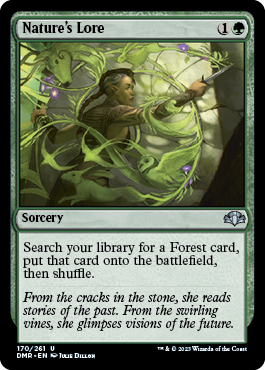
Nature's Lore
{1}{G}
Sorcery
Search your library for a Forest card, put that card onto the battlefield, then shuffle.
- You may find a basic Forest or any land card with the land type Forest.
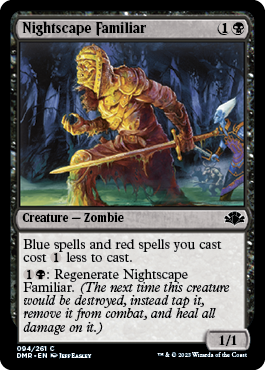
Nightscape Familiar
{1}{B}
Creature — Zombie
1/1
Blue spells and red spells you cast cost {1} less to cast.
{1}{B}: Regenerate Nightscape Familiar. (The next time this creature would be destroyed, instead tap it, remove it from combat, and heal all damage on it.)
- A spell you cast that's blue and red costs {1} less, not {2} less.
- Activating the ability creates a replacement effect that acts like a shield, replacing the next time Nightscape Familiar would be destroyed that turn. This shield works against effects that try to destroy Nightscape Familiar or lethal damage that would be dealt to Nightscape Familiar.
- Nightscape Familiar can regenerate even if it isn't in combat, it's already tapped, or it's undamaged.
- You can activate the regeneration ability even if Nightscape Familiar isn't at risk of being destroyed.
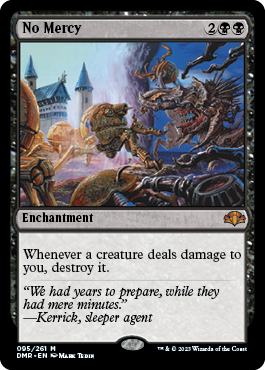
No Mercy
{2}{B}{B}
Enchantment
Whenever a creature deals damage to you, destroy it.
- No Mercy's ability triggers whenever any creature, including creatures you control, deals damage to you, not only combat damage.
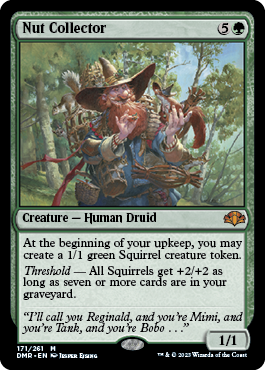
Nut Collector
{5}{G}
Creature — Human Druid
1/1
At the beginning of your upkeep, you may create a 1/1 green Squirrel creature token.
Threshold — All Squirrels get +2/+2 as long as seven or more cards are in your graveyard.
- Because damage remains marked on a creature until the damage is removed as the turn ends, nonlethal damage dealt to Squirrels may become lethal if the number of cards in your graveyard falls below seven.
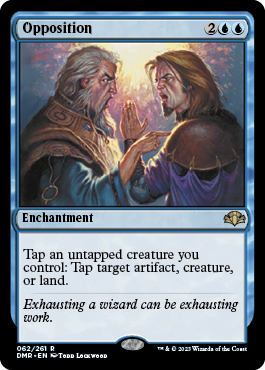
Opposition
{2}{U}{U}
Enchantment
Tap an untapped creature you control: Tap target artifact, creature, or land.
- Once a player announces that they're casting a spell or activating an ability, no player may take other actions until the spell or ability has been paid for. Notably, other players can't try to tap that player's permanents to stop them from paying {T} or to stop them from producing enough mana.
- You can tap any untapped creature you control to activate Opposition's ability, even one you haven't controlled continuously since the beginning of your most recent turn.
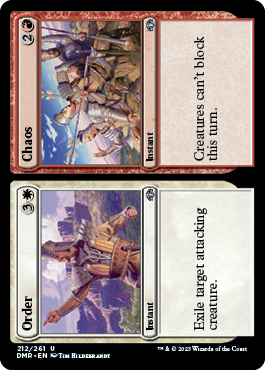
Order // Chaos
{3}{W}
Instant
Exile target attacking creature.
//
Chaos
{2}{R}
Instant
Creatures can't block this turn.
- Chaos will stop any creature from being declared as a blocker that turn, including ones that weren't on the battlefield as Chaos resolved.
- Casting Chaos after blockers have been declared won't cause any of those blocks to be undone.
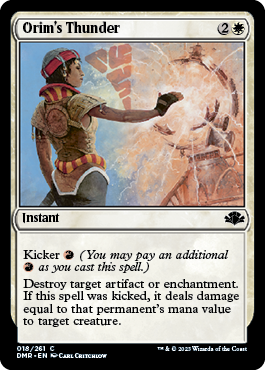
Orim's Thunder
{2}{W}
Instant
Kicker {R} (You may pay an additional {R} as you cast this spell.)
Destroy target artifact or enchantment. If this spell was kicked, it deals damage equal to that permanent's mana value to target creature.
- If Orim's Thunder is kicked, it's the source of damage dealt to the target creature, not the artifact or enchantment.
- If Orim's Thunder is kicked, but the artifact or enchantment is an illegal target as Orim's Thunder tries to resolve, Orim's Thunder won't be able to determine the artifact or enchantment's mana value. No damage will be dealt to the target creature, even if it remained a legal target. If only the creature has become an illegal target, the artifact or enchantment will still be destroyed. (If both targets become illegal, Orim's Thunder won't resolve at all.)
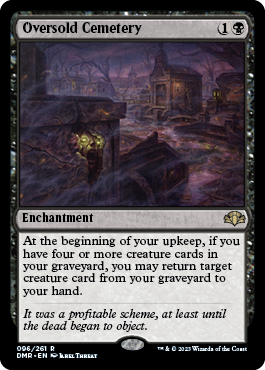
Oversold Cemetery
{1}{B}
Enchantment
At the beginning of your upkeep, if you have four or more creature cards in your graveyard, you may return target creature card from your graveyard to your hand.
- Oversold Cemetery's ability will check your graveyard as your upkeep begins, before any player has the opportunity to take any actions. If you have fewer than four creature cards in your graveyard at that time, the ability won't trigger at all. If the ability does trigger, it will check again as it tries to resolve. If you have fewer than four creature cards in your graveyard at that point, the ability won't have any effect.
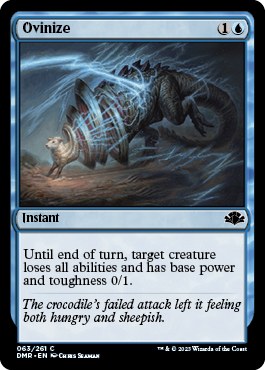
Ovinize
{1}{U}
Instant
Until end of turn, target creature loses all abilities and has base power and toughness 0/1.
- Ovinize overwrites all previous effects that set the creature's base power and toughness to specific values. Any power- or toughness-setting effects that start to apply after Ovinize resolves will overwrite this effect.
- Effects that modify a creature's power and/or toughness without setting them to specific values will apply to the creature no matter when those effects began. The same is true for counters that change the creature's power and/or toughness.
- If the affected creature gains an ability after Ovinize resolves, it will keep that ability.
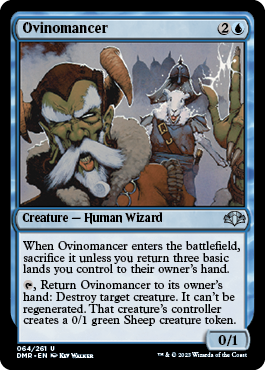
Ovinomancer
{2}{U}
Creature — Human Wizard
0/1
When Ovinomancer enters the battlefield, sacrifice it unless you return three basic lands you control to their owner's hand.
{T}, Return Ovinomancer to its owner's hand: Destroy target creature. It can't be regenerated. That creature's controller creates a 0/1 green Sheep creature token.
- Ovinomancer is a legal target for its own ability. Activating that ability will cause Ovinomancer to return to its owner's hand, so the ability will have an illegal target. It won't resolve, and no one will create a Sheep token.
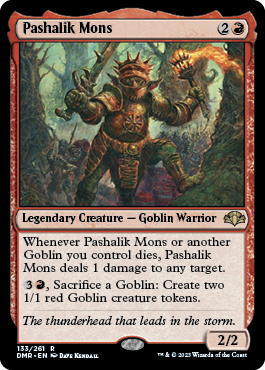
Pashalik Mons
{2}{R}
Legendary Creature — Goblin Warrior
2/2
Whenever Pashalik Mons or another Goblin you control dies, Pashalik Mons deals 1 damage to any target.
{3}{R}, Sacrifice a Goblin: Create two 1/1 red Goblin creature tokens.
- If Pashalik Mons and one or more other Goblins you control die at the same time, its ability will trigger for each of those creatures.
- You can sacrifice Pashalik Mons to pay the cost of its last ability.
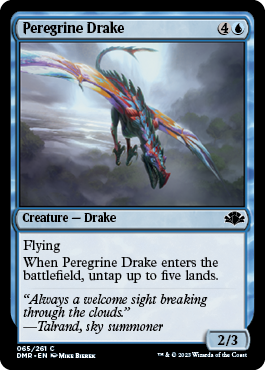
Peregrine Drake
{4}{U}
Creature — Drake
2/3
Flying
When Peregrine Drake enters the battlefield, untap up to five lands.
- You choose which lands to untap as the triggered ability resolves. They aren't targeted, and they don't have to be lands that you control.
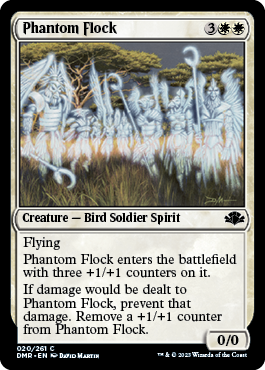
Phantom Flock
{3}{W}{W}
Creature — Bird Soldier Spirit
0/0
Flying
Phantom Flock enters the battlefield with three +1/+1 counters on it.
If damage would be dealt to Phantom Flock, prevent that damage. Remove a +1/+1 counter from Phantom Flock.
- If Phantom Flock would be dealt damage from multiple sources at the same time (say, because it's blocked by multiple creatures), all of the damage is prevented and only one +1/+1 counter is removed.
- If damage that would be dealt to Phantom Flock can't be prevented, the damage is dealt and a +1/+1 counter is removed from Phantom Flock.
- If Phantom Flock has no +1/+1 counters on it (but is still on the battlefield because something else is raising its toughness), damage that would be dealt to it is still prevented.
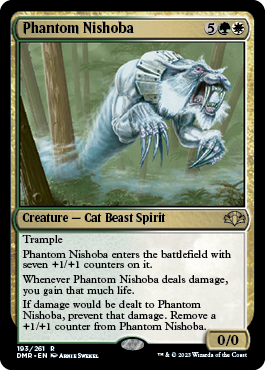
Phantom Nishoba
{5}{G}{W}
Creature — Cat Beast Spirit
0/0
Trample
Phantom Nishoba enters the battlefield with seven +1/+1 counters on it.
Whenever Phantom Nishoba deals damage, you gain that much life.
If damage would be dealt to Phantom Nishoba, prevent that damage. Remove a +1/+1 counter from Phantom Nishoba.
- If Phantom Nishoba would be dealt damage from multiple sources at the same time (say, because it's blocked by multiple creatures), all of the damage is prevented and only one +1/+1 counter is removed.
- If damage that would be dealt to Phantom Nishoba can't be prevented, the damage is dealt and a +1/+1 counter is removed from Phantom Nishoba.
- If Phantom Nishoba has no +1/+1 counters on it (but is still on the battlefield because something else is raising its toughness), damage that would be dealt to it is still prevented.
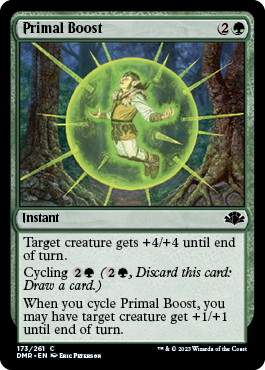
Primal Boost
{2}{G}
Instant
Target creature gets +4/+4 until end of turn.
Cycling {2}{G} ({2}{G}, Discard this card: Draw a card.)
When you cycle Primal Boost, you may have target creature get +1/+1 until end of turn.
- You can cycle this card even if there are no legal targets for the triggered ability.
- When you cycle this card, first the cycling ability goes on the stack, then the triggered ability goes on the stack on top of it. The triggered ability will resolve before you draw a card from the cycling ability.
- The cycling ability and the triggered ability are separate. If the triggered ability doesn't resolve (because, for example, it has been countered, or all of its targets have become illegal), the cycling ability will still resolve and you'll draw a card.
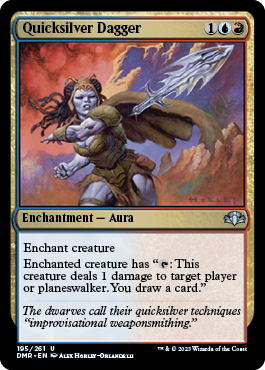
Quicksilver Dagger
{1}{U}{R}
Enchantment — Aura
Enchant creature
Enchanted creature has "{T}: This creature deals 1 damage to target player or planeswalker. You draw a card."
- The enchanted creature is the source of both the damage ability and the resulting damage, not Quicksilver Dagger.
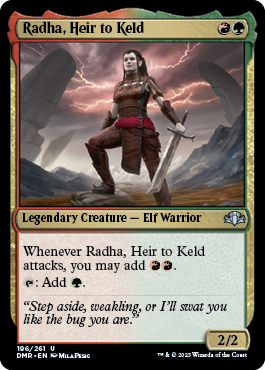
Radha, Heir to Keld
{R}{G}
Legendary Creature — Elf Warrior
2/2
Whenever Radha, Heir to Keld attacks, you may add {R}{R}.
{T}: Add {G}.
- Radha's triggered ability is not a mana ability because it doesn't trigger from another mana ability. It goes on the stack and it can be responded to.
- You lose the mana produced by Radha's ability before blockers are declared if you don't spend it first.
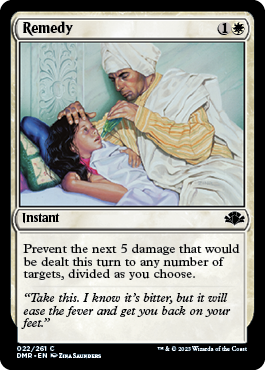
Remedy
{1}{W}
Instant
Prevent the next 5 damage that would be dealt this turn to any number of targets, divided as you choose.
- You divide the prevention effects as you cast Remedy, not as it resolves. Each target must be assigned at least 1 prevention "shield." You can't choose more than five targets and assign none to a target.
- If some of the targets become illegal, the original division of prevention effects still applies, but the effects that would have been created for illegal targets aren't created at all.
- If multiple sources would deal damage to an affected target at once, that target or that target's controller chooses which source's damage to prevent for each "shield."
- If multiple replacement effects apply to a player or permanent being dealt damage, that player or the controller of that permanent chooses the order to apply them, not the controller of the source of damage.
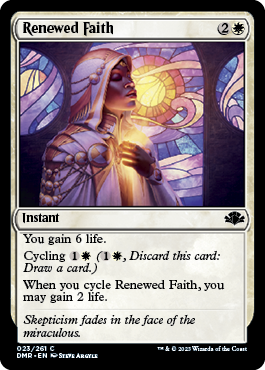
Renewed Faith
{2}{W}
Instant
You gain 6 life.
Cycling {1}{W} ({1}{W}, Discard this card: Draw a card.)
When you cycle Renewed Faith, you may gain 2 life.
- When you cycle this card, first the cycling ability goes on the stack, then the triggered ability goes on the stack on top of it. The triggered ability will resolve before you draw a card from the cycling ability.
- The cycling ability and the triggered ability are separate. If the triggered ability doesn't resolve (because, for example, it has been countered, or all of its targets have become illegal), the cycling ability will still resolve and you'll draw a card.
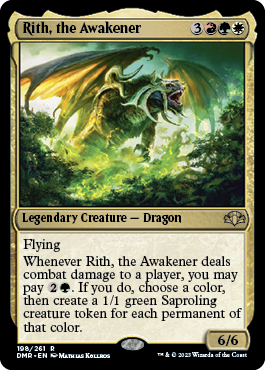
Rith, the Awakener
{3}{R}{G}{W}
Legendary Creature — Dragon
6/6
Flying
Whenever Rith, the Awakener deals combat damage to a player, you may pay {2}{G}. If you do, choose a color, then create a 1/1 green Saproling creature token for each permanent of that color.
- You choose whether to pay {2}{G} as Rith's ability resolves. Once you make that choice, no player may take actions until the Saprolings are created (if you paid) and the ability has finished resolving.
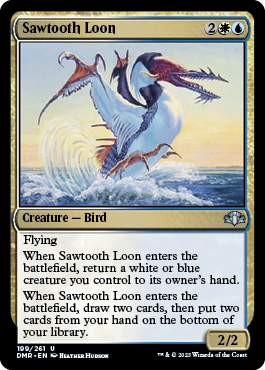
Sawtooth Loon
{2}{W}{U}
Creature — Bird
2/2
Flying
When Sawtooth Loon enters the battlefield, return a white or blue creature you control to its owner's hand.
When Sawtooth Loon enters the battlefield, draw two cards, then put two cards from your hand on the bottom of your library.
- You choose which white or blue creature you control to return to its owner's hand as the first triggered ability resolves. That creature isn't targeted by the ability. You may choose Sawtooth Loon itself. If Sawtooth Loon is the only white or blue creature you control at that time, you must return it to its owner's hand.
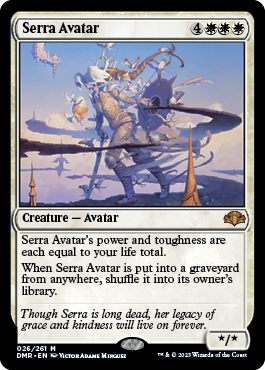
Serra Avatar
{4}{W}{W}{W}
Creature — Avatar
*/*
Serra Avatar's power and toughness are each equal to your life total.
When Serra Avatar is put into a graveyard from anywhere, shuffle it into its owner's library.
- The ability that defines Serra Avatar's power and toughness works in all zones, not only the battlefield.
- If Serra Avatar is no longer in your graveyard when its triggered ability resolves, you still shuffle your library.
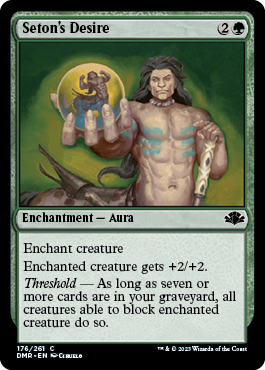
Seton's Desire
{2}{G}
Enchantment — Aura
Enchant creature
Enchanted creature gets +2/+2.
Threshold — As long as seven or more cards are in your graveyard, all creatures able to block enchanted creature do so.
- If a creature the defending player controls can't block the enchanted creature for any reason (such as being tapped), then it doesn't block that creature. If there's a cost associated with having a creature block the enchanted creature, the defending player isn't forced to pay that cost, so it doesn't have to block in that case either.
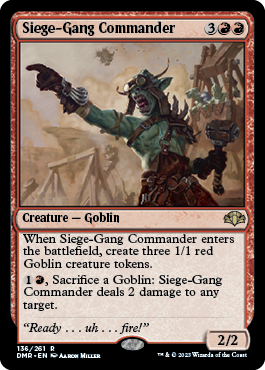
Siege-Gang Commander
{3}{R}{R}
Creature — Goblin
2/2
When Siege-Gang Commander enters the battlefield, create three 1/1 red Goblin creature tokens.
{1}{R}, Sacrifice a Goblin: Siege-Gang Commander deals 2 damage to any target.
- You can sacrifice any Goblin you control to activate Siege-Gang Commander's activated ability, including Siege-Gang Commander itself.
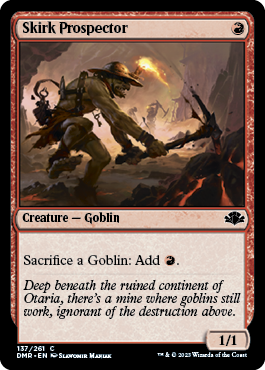
Skirk Prospector
{R}
Creature — Goblin
1/1
Sacrifice a Goblin: Add {R}.
- You can sacrifice any Goblin you control to activate Skirk Prospector's activated ability, including Skirk Prospector itself. Note that once you sacrifice Skirk Prospector, you won't be able to activate its ability again, so if you'd like to sacrifice multiple Goblins including Skirk Prospector for mana, be sure to sacrifice Skirk Prospector last.
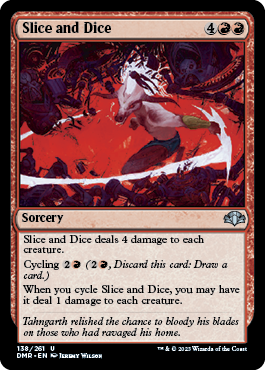
Slice and Dice
{4}{R}{R}
Sorcery
Slice and Dice deals 4 damage to each creature.
Cycling {2}{R} ({2}{R}, Discard this card: Draw a card.)
When you cycle Slice and Dice, you may have it deal 1 damage to each creature.
- When you cycle this card, first the cycling ability goes on the stack, then the triggered ability goes on the stack on top of it. The triggered ability will resolve before you draw a card from the cycling ability.
- The cycling ability and the triggered ability are separate. If the triggered ability doesn't resolve (because, for example, it has been countered, or all of its targets have become illegal), the cycling ability will still resolve and you'll draw a card.
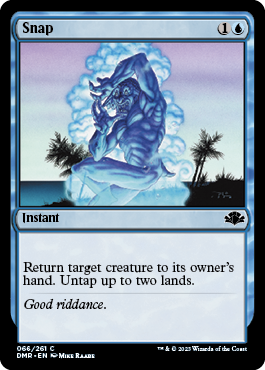
Snap
{1}{U}
Instant
Return target creature to its owner's hand. Untap up to two lands.
- You choose which lands to untap as the spell resolves. They aren't targeted, and they don't have to be lands that you control.
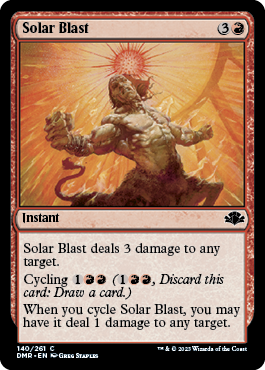
Solar Blast
{3}{R}
Instant
Solar Blast deals 3 damage to any target.
Cycling {1}{R}{R} ({1}{R}{R}, Discard this card: Draw a card.)
When you cycle Solar Blast, you may have it deal 1 damage to any target.
- You can cycle this card even if there are no legal targets for the triggered ability.
- When you cycle this card, first the cycling ability goes on the stack, then the triggered ability goes on the stack on top of it. The triggered ability will resolve before you draw a card from the cycling ability.
- The cycling ability and the triggered ability are separate. If the triggered ability doesn't resolve (because, for example, it has been countered, or all of its targets have become illegal), the cycling ability will still resolve and you'll draw a card.
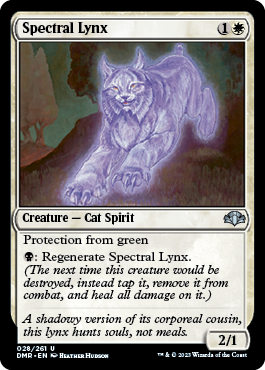
Spectral Lynx
{1}{W}
Creature — Cat Spirit
2/1
Protection from green
{B}: Regenerate Spectral Lynx. (The next time this creature would be destroyed, instead tap it, remove it from combat, and heal all damage on it.)
- Activating the ability creates a replacement effect that acts like a shield, replacing the next time Spectral Lynx would be destroyed that turn. This shield works against effects that try to destroy Spectral Lynx or lethal damage that would be dealt to Spectral Lynx.
- Spectral Lynx can regenerate even if it isn't in combat, it's already tapped, or it's undamaged.
- You can activate the regeneration ability even if Spectral Lynx isn't at risk of being destroyed.
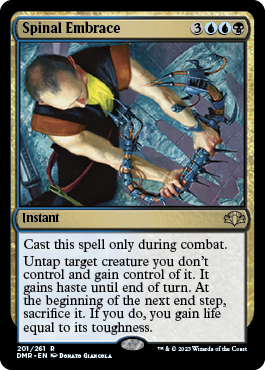
Spinal Embrace
{3}{U}{U}{B}
Instant
Cast this spell only during combat.
Untap target creature you don't control and gain control of it. It gains haste until end of turn. At the beginning of the next end step, sacrifice it. If you do, you gain life equal to its toughness.
- You must sacrifice the creature if you still control it as the delayed triggered ability resolves.
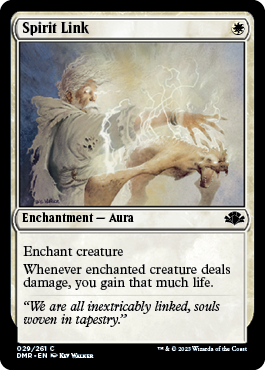
Spirit Link
{W}
Enchantment — Aura
Enchant creature
Whenever enchanted creature deals damage, you gain that much life.
- The triggered ability triggers when the enchanted creature deals any damage, not only combat damage.
- Unlike the lifelink ability, the ability of Spirit Link is a triggered ability that goes on the stack and may be responded to. Notably, if the enchanted creature deals damage at the same time you're dealt enough damage to reduce your life total to 0 or less, you'll lose the game before you can gain any life.
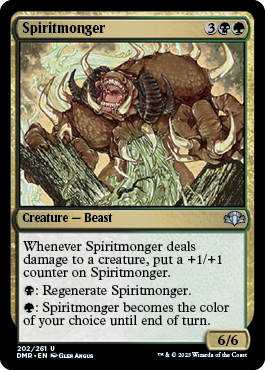
Spiritmonger
{3}{B}{G}
Creature — Beast
6/6
Whenever Spiritmonger deals damage to a creature, put a +1/+1 counter on Spiritmonger.
{B}: Regenerate Spiritmonger.
{G}: Spiritmonger becomes the color of your choice until end of turn.
- Activating the regeneration ability creates a replacement effect that acts like a shield, replacing the next time Spiritmonger would be destroyed that turn. This shield works against effects that try to destroy Spiritmonger or lethal damage that would be dealt to Spiritmonger.
- Spiritmonger can regenerate even if it isn't in combat, it's already tapped, or it's undamaged.
- You can activate the regeneration ability even if Spiritmonger isn't at risk of being destroyed.
- Spiritmonger's last ability causes it to become only the chosen color. It will no longer be the colors it was previously.
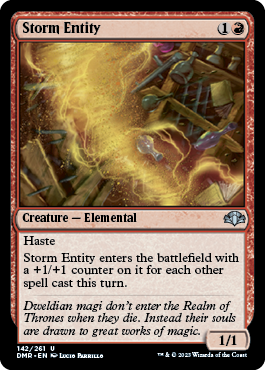
Storm Entity
{1}{R}
Creature — Elemental
1/1
Haste
Storm Entity enters the battlefield with a +1/+1 counter on it for each other spell cast this turn.
- The number of other spells cast this turn is determined as Storm Entity enters the battlefield. It will count spells that were cast while Storm Entity was on the stack. It will not count copies of spells that were created directly on the stack.
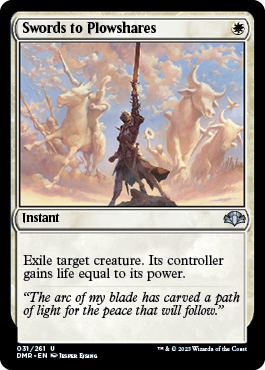
Swords to Plowshares
{W}
Instant
Exile target creature. Its controller gains life equal to its power.
- Use the power of the creature from when it was last on the battlefield to determine how much life is gained.
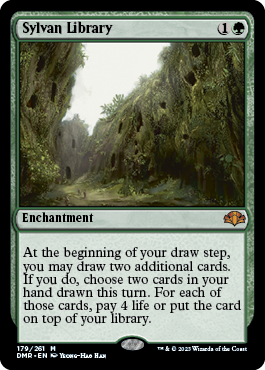
Sylvan Library
{1}{G}
Enchantment
At the beginning of your draw step, you may draw two additional cards. If you do, choose two cards in your hand drawn this turn. For each of those cards, pay 4 life or put the card on top of your library.
- You always perform your normal draw before this ability. The normal draw occurs before anything can be placed on the stack during a player's draw step.
- If you control other triggered abilities that allow you to draw cards during your draw step, you can choose to order Sylvan Library's ability before or after those abilities. Triggered abilities controlled by other players will resolve before triggered abilities you control.
- Any cards drawn prior to Sylvan Library's ability resolving, including in your upkeep or in response to Sylvan Library's triggered ability, can be chosen to be put back using this effect. Sylvan Library's controller is responsible for keeping these cards distinguishable in hand, such as by keeping them separate from cards that began the turn in hand.
- If you control more than one Sylvan Library, the triggered ability of each will resolve in sequence. You don't get to draw all the cards at once and then put them all back at once.
- You can put back zero, one, or two cards.
- If you choose to draw two cards, then replace one or more of those draws with some other effect, the rest of Sylvan Library's ability still happens. If you've actually drawn only one card that turn, you must choose that card and either pay 4 life or put it on top of your library. If you haven't actually drawn any cards that turn, the rest of the ability has no effect.
- It's not possible to take any actions between drawing the cards and choosing two cards. You can't cast the cards you drew to avoid having two cards to choose.
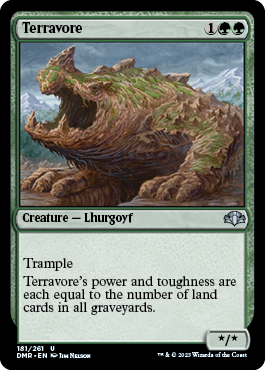
Terravore
{1}{G}{G}
Creature — Lhurgoyf
*/*
Trample
Terravore's power and toughness are each equal to the number of land cards in all graveyards.
- The ability that defines Terravore's power and toughness works in all zones, not only the battlefield.
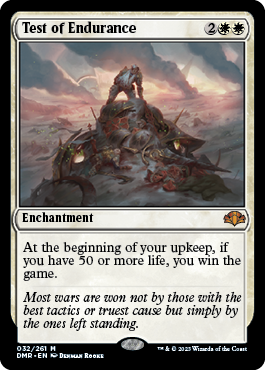
Test of Endurance
{2}{W}{W}
Enchantment
At the beginning of your upkeep, if you have 50 or more life, you win the game.
- Test of Endurance's ability will check your life total as your upkeep begins, before any player has the opportunity to take any actions. If you don't have 50 or more life at that time, the ability won't trigger at all. If the ability does trigger, it will check again as it tries to resolve. If your life total has fallen below 50 at that point, the ability won't have any effect.
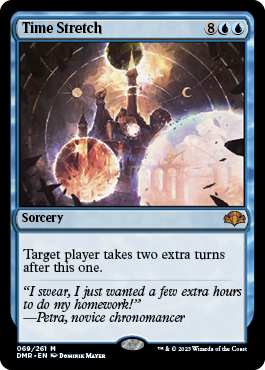
Time Stretch
{8}{U}{U}
Sorcery
Target player takes two extra turns after this one.
- If multiple "extra turn" effects resolve in the same turn, take them in the reverse of the order that the effects resolved. In other words, the most recently created extra turn is taken first.
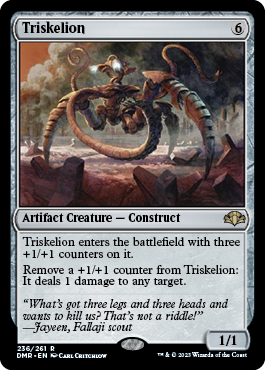
Triskelion
{6}
Artifact Creature — Construct
1/1
Triskelion enters the battlefield with three +1/+1 counters on it.
Remove a +1/+1 counter from Triskelion: It deals 1 damage to any target.
- If you activate the ability of an attacking or blocking Triskelion during the declare blockers step, it will deal less combat damage as a result. If you wait until the combat damage step, but Triskelion is dealt lethal damage, it'll be destroyed before you get a chance to activate its ability.
- If Triskelion has damage marked on it, activating its ability may cause that damage to become lethal. For example, say a Triskelion with two +1/+1 counters on it has been dealt 2 damage earlier in the turn. If you activate its ability by removing a +1/+1 counter from it, it now has 2 toughness and is destroyed as a state-based action. You won't be able to remove the other +1/+1 counter from it to activate its ability again. The first activation of the ability will still resolve.
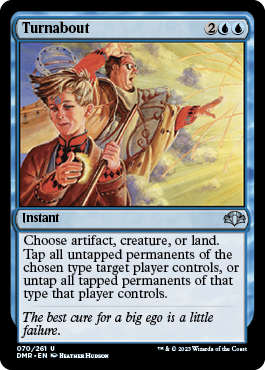
Turnabout
{2}{U}{U}
Instant
Choose artifact, creature, or land. Tap all untapped permanents of the chosen type target player controls, or untap all tapped permanents of that type that player controls.
- You decide on resolution if you are tapping or untapping, and which kind of permanent you are affecting.
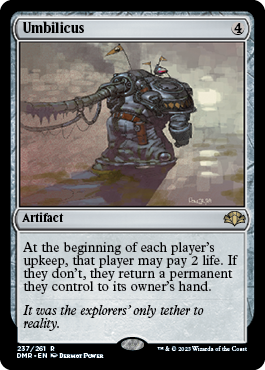
Umbilicus
{4}
Artifact
At the beginning of each player's upkeep, that player may pay 2 life. If they don't, they return a permanent they control to its owner's hand.
- The player makes all choices as the triggered ability resolves. They permanent they choose to return to its owner's hand, if any, isn't targeted by the ability.
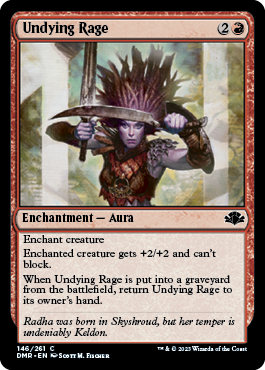
Undying Rage
{2}{R}
Enchantment — Aura
Enchant creature
Enchanted creature gets +2/+2 and can't block.
When Undying Rage is put into a graveyard from the battlefield, return Undying Rage to its owner's hand.
- If the target creature is an illegal target by the time Undying Rage tries to resolve, it doesn't resolve. It's put into its owner's graveyard from the stack rather than from the battlefield, so its last ability won't trigger.
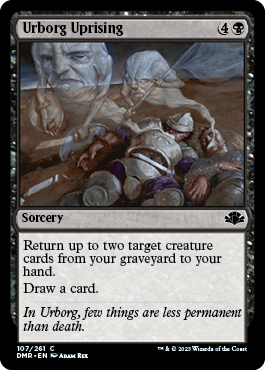
Urborg Uprising
{4}{B}
Sorcery
Return up to two target creature cards from your graveyard to your hand.
Draw a card.
- You can cast Urborg Uprising with no targets if you want to only draw a card.
- If you chose at least one target and all targets are illegal as Urborg Uprising tries to resolve, the spell won't resolve and you won't draw a card.
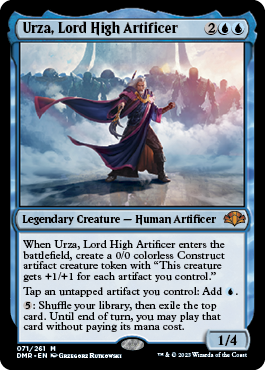
Urza, Lord High Artificer
{2}{U}{U}
Legendary Creature — Human Artificer
1/4
When Urza, Lord High Artificer enters the battlefield, create a 0/0 colorless Construct artifact creature token with "This creature gets +1/+1 for each artifact you control."
Tap an untapped artifact you control: Add {U}.
{5}: Shuffle your library, then exile the top card. Until end of turn, you may play that card without paying its mana cost.
- The token created by Urza's first ability will count itself, so it'll be at least 1/1.
- You can tap any untapped artifact you control to pay the cost of the mana ability, including an artifact creature you haven't controlled continuously since the beginning of your most recent turn. Tapping an Equipment this way won't affect its abilities or the equipped creature.
- If you don't play the card exiled with Urza's last ability, it remains in exile.
- Urza's last ability doesn't change when you can play the exiled card. For example, if you exile a sorcery card, you can cast it only during your main phase when the stack is empty. If you exile a land card, you can play it only during your main phase and only if you have an available land play remaining.
- If a spell has {X} in its mana cost, you must choose 0 as the value of X when casting it without paying its mana cost.
- If you cast a card "without paying its mana cost," you can't choose to cast it for any alternative costs. You can, however, pay additional costs. If the card has any mandatory additional costs, you must pay those to cast the card.
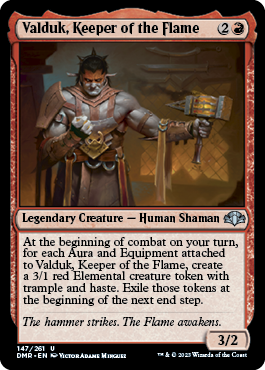
Valduk, Keeper of the Flame
{2}{R}
Legendary Creature — Human Shaman
3/2
At the beginning of combat on your turn, for each Aura and Equipment attached to Valduk, Keeper of the Flame, create a 3/1 red Elemental creature token with trample and haste. Exile those tokens at the beginning of the next end step.
- Valduk counts all Auras and Equipment attached to it, not only Auras and Equipment you control.
- If Valduk leaves the battlefield after its ability has triggered but before it resolves, use the number of Auras and Equipment that were last attached to it before it left the battlefield to determine how many tokens to create.
- If Valduk leaves the battlefield after its ability has resolved, the tokens are still exiled at the beginning of the next end step.
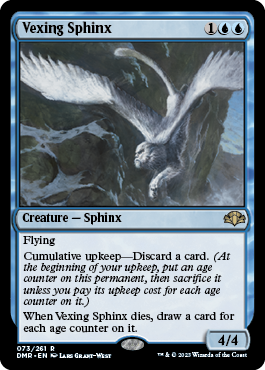
Vexing Sphinx
{1}{U}{U}
Creature — Sphinx
4/4
Flying
Cumulative upkeep—Discard a card. (At the beginning of your upkeep, put an age counter on this permanent, then sacrifice it unless you pay its upkeep cost for each age counter on it.)
When Vexing Sphinx dies, draw a card for each age counter on it.
- Paying cumulative upkeep is always optional. If it's not paid, the permanent with cumulative upkeep is sacrificed. Partial payments of the total cumulative upkeep cost can't be made. For example, if Vexing Sphinx has three age counters on it when its cumulative upkeep ability triggers, it gets another age counter and then its controller chooses to either discard four cards or sacrifice it.
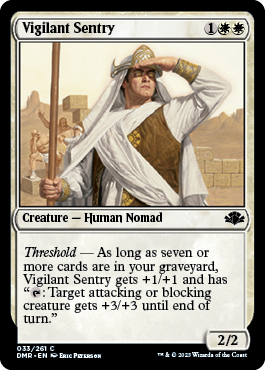
Vigilant Sentry
{1}{W}{W}
Creature — Human Nomad
2/2
Threshold — As long as seven or more cards are in your graveyard, Vigilant Sentry gets +1/+1 and has "{T}: Target attacking or blocking creature gets +3/+3 until end of turn."
- Once you activate the ability Vigilant Sentry gives itself, it doesn't matter what happens to the number of cards in your graveyard. That ability will still resolve even if that number drops below seven in response.
- Because damage remains marked on a creature until the damage is removed as the turn ends, nonlethal damage dealt to Vigilant Sentry may become lethal if the number of cards in your graveyard falls below seven.
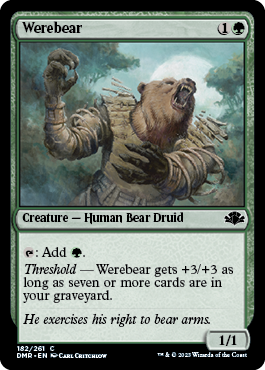
Werebear
{1}{G}
Creature — Human Bear Druid
1/1
{T}: Add {G}.
Threshold — Werebear gets +3/+3 as long as seven or more cards are in your graveyard.
- Because damage remains marked on a creature until the damage is removed as the turn ends, nonlethal damage dealt to Werebear may become lethal if the number of cards in your graveyard falls below seven.
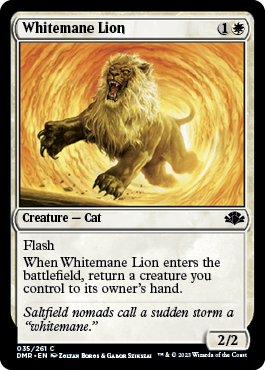
Whitemane Lion
{1}{W}
Creature — Cat
2/2
Flash
When Whitemane Lion enters the battlefield, return a creature you control to its owner's hand.
- You may return Whitemane Lion itself to its owner's hand as its triggered ability resolves. If you don't control any other creature, you must return it.
- Whitemane Lion's ability doesn't target any creature, therefore no player may take actions between the time you choose the creature to return and the time you return it.
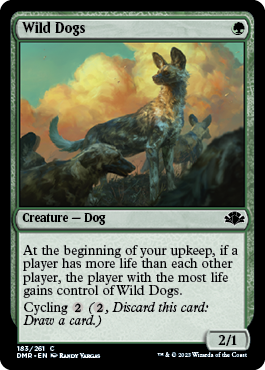
Wild Dogs
{G}
Creature — Dog
2/1
At the beginning of your upkeep, if a player has more life than each other player, the player with the most life gains control of Wild Dogs.
Cycling {2} ({2}, Discard this card: Draw a card.)
- Wild Dogs's first ability will check life totals as your upkeep begins, before any player has the opportunity to take any actions. If no one player has more life than all other players at that time (i.e., if two or more players are tied for the most life), the ability won't trigger at all. If the ability does trigger, it will check again as it tries to resolve. If no player has more life than all others by that point, the ability won't have any effect. The player who had the most life as the ability triggered doesn't have to be the same player as the one who has the most life as the ability resolves.
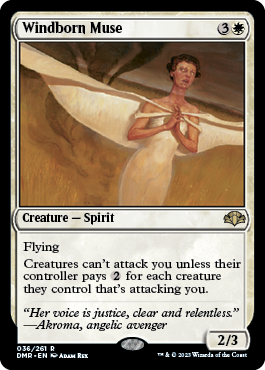
Windborn Muse
{3}{W}
Creature — Spirit
2/3
Flying
Creatures can't attack you unless their controller pays {2} for each creature they control that's attacking you.
- Creatures may still attack planeswalkers you control without their controller paying a cost.
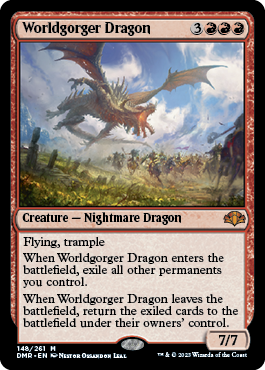
Worldgorger Dragon
{3}{R}{R}{R}
Creature — Nightmare Dragon
7/7
Flying, trample
When Worldgorger Dragon enters the battlefield, exile all other permanents you control.
When Worldgorger Dragon leaves the battlefield, return the exiled cards to the battlefield under their owners' control.
- If Worldgorger Dragon leaves the battlefield before its enters-the-battlefield ability resolves, the "leaves-the-battlefield" ability will trigger and resolve first. It won't return anything. Then the enters-the-battlefield ability will exile all other permanents you control indefinitely.
- If an Aura is exiled with Worldgorger Dragon and then returns to the battlefield, the player who controls the Aura as it enters the battlefield chooses what it will enchant. An Aura put onto the battlefield this way doesn't target anything (so it could be attached to an opponent's permanent with hexproof, for example), but the Aura's enchant ability restricts what it can be attached to. If the Aura can't legally be attached to anything, it stays exiled. It can't enter the battlefield enchanting a permanent that enters the battlefield at the same time.
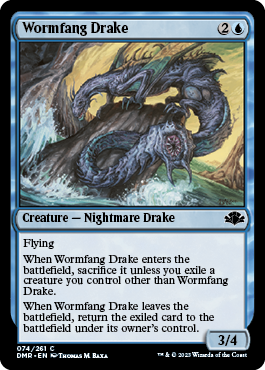
Wormfang Drake
{2}{U}
Creature — Nightmare Drake
3/4
Flying
When Wormfang Drake enters the battlefield, sacrifice it unless you exile a creature you control other than Wormfang Drake.
When Wormfang Drake leaves the battlefield, return the exiled card to the battlefield under its owner's control.
- You choose which creature you control to exile (if any) as the enters-the-battlefield ability resolves. Once you make that choice, no player may take actions until the chosen creature is exiled or Wormfang Drake is sacrificed and the ability has finished resolving.
- If you don't control any other creatures as the enters-the-battlefield ability resolves, you must sacrifice Wormfang Drake.
- If Wormfang Drake leaves the battlefield before its enters-the-battlefield ability resolves, the "leaves-the-battlefield" ability will trigger and resolve first. It won't return anything. Then the enters-the-battlefield ability will resolve. If you exile a creature you control, it will be exiled indefinitely. Wormfang Drake won't return it.
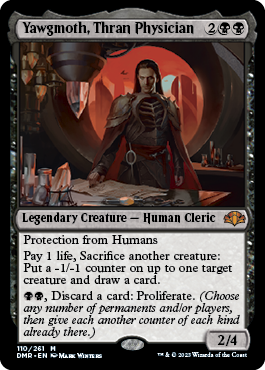
Yawgmoth, Thran Physician
{2}{B}{B}
Legendary Creature — Human Cleric
2/4
Protection from Humans
Pay 1 life, Sacrifice another creature: Put a -1/-1 counter on up to one target creature and draw a card.
{B}{B}, Discard a card: Proliferate. (Choose any number of permanents and/or players, then give each another counter of each kind already there.)
- If a permanent has +1/+1 counters and -1/-1 counters on it, they're removed in pairs as a state-based action until that permanent has only one of those kinds of counters on it.
- To proliferate, you can choose any permanent that has a counter, including ones controlled by opponents. You can't choose cards in any zone other than the battlefield, even if they have counters on them.
- You don't have to choose every permanent or player that has a counter, only the ones you want to add another counter to. Since "any number" includes zero, you don't have to choose any permanents at all, and you don't have to choose any players at all.
- Players can respond to a spell or ability whose effect includes proliferating. Once that spell or ability starts to resolve, however, and its controller chooses which permanents and players will get new counters, it's too late for anyone to respond.
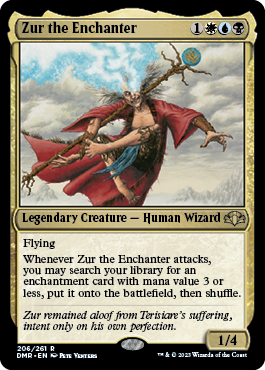
Zur the Enchanter
{1}{W}{U}{B}
Legendary Creature — Human Wizard
1/4
Flying
Whenever Zur the Enchanter attacks, you may search your library for an enchantment card with mana value 3 or less, put it onto the battlefield, then shuffle.
- If you put an Aura card onto the battlefield with Zur's ability, you choose what it will enchant as it enters the battlefield. An Aura put onto the battlefield this way doesn't target anything (so it could be attached to an opponent's permanent with hexproof, for example), but the Aura's enchant ability restricts what it can be attached to. If the Aura can't legally be attached to anything, it remains in your library.
©2023 Wizards of the Coast LLC Wizards of the Coast, Magic: The Gathering, their logos, Magic, and the WUBRGCT symbols are property of Wizards in the USA and other countries. U.S. Pat. No. RE 37,957.

